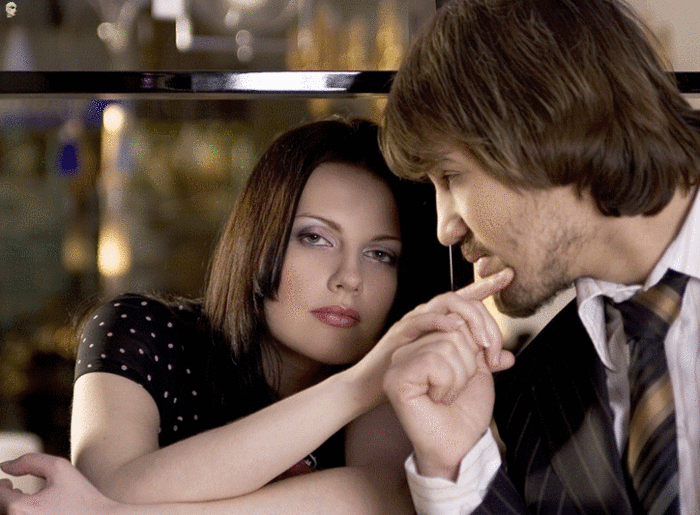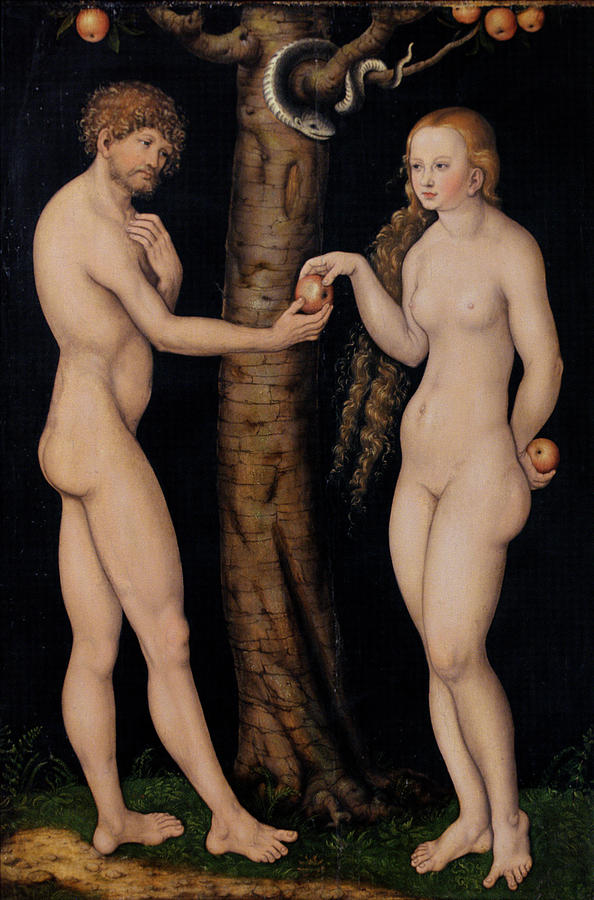-
 La femme sera toujours prisonière de l'homme parce qu'elle recherche un amour de cinéma. Dans mon pays d'origine, Haiti, la femme est esclave car elle a faim. Ici, elle fait son malheur car elle écoute trop le cinéma. Les Québécoises n'ont aucune raison de ne pas contrôler leur destin et leur vie.
La femme sera toujours prisonière de l'homme parce qu'elle recherche un amour de cinéma. Dans mon pays d'origine, Haiti, la femme est esclave car elle a faim. Ici, elle fait son malheur car elle écoute trop le cinéma. Les Québécoises n'ont aucune raison de ne pas contrôler leur destin et leur vie.Vous souhaitez mettre l'étincelle de retour dans votre relation amoureuse? Commencer à dater autres couples, suggère une nouvelle étude. Relations amoureuses commencent souvent aussi agréable voire passionnante, mais parfois peuvent devenir routine et ennuyeux. Une étude de l'Université Wayne State a révélé que les couples de rencontre qui intègrent d'autres couples dans leur vie sociale sont plus susceptibles d'avoir des relations amoureuses heureux et satisfaisant. Richard B. Slatcher, professeur adjoint de psychologie à l'université des arts libéraux et sciences de WSU et un résident de Birmingham, au Michigan, spécialisée en psychologie sociale et de la santé. Sa recherche récente suggère que passer du temps de qualité avec d'autres couples pourrait être un moyen important d'améliorer les relations amoureuses à long terme. Son étude a porté sur 60 couples de rencontre dans un environnement de laboratoire contrôlé. L'objectif était de mieux comprendre comment les amitiés entre les couples se forment, et d'apprendre comment ces amitiés affectés relation amoureuse de chaque couple. Chaque couple a été jumelé avec un autre couple et donné une série de questions à discuter en groupe. La moitié des groupes ont reçu des questions de grande information destinées à susciter la discussion intense, tandis que l'autre moitié recevait papotage questions portant sur des activités quotidiennes sans émotion. «Dans cette étude, nous avons découvert que les couples qui ont été placés dans le" vite amis "groupe se sentait plus proche des couples qu'ils interagissaient avec, et étaient plus susceptibles de réellement se rencontrer à nouveau avec eux au cours du mois suivant", a déclaré Slatcher. "Nous avons également appris que ces mêmes couples ont estimé que cette amitié a mis une étincelle dans leurs propres relations, et ils se sentaient beaucoup plus proches de leurs partenaires romantiques." Les couples du groupe de haut divulgation rapporté des augmentations plus importantes dans les sentiments positifs après l'interaction intense. Ils ont également estimé l'interaction était plus nouveau et qu'ils ont appris de nouvelles choses sur leur partenaire amoureux par rapport aux couples dans le groupe petit-talk. En outre, un tiers des couples dans le groupe de haut divulgation contacté l'autre couple, ils se sont rencontrés à l'étude, alors qu'aucun des couples dans le groupe petit-talk a pris contact avec le couple qu'ils avaient rencontré. "Cette étude suggère que si votre relation amoureuse a un cas de marasme, de s'amuser avec un autre couple peut aider à faire votre propre relation plus satisfaisante », a déclaré Slatcher. L'étude est récemment apparu dans les relations personnelles. Image Source: Thinkstock photos / Getty Images
 votre commentaire
votre commentaire
-
Une nouvelle étude, publiée dans le Journal of Evolutionary Psychology, a tenté de savoir pourquoi les hommes pratiquaient le sexe oral puisque cela n'est pas un "geste naturel" de reproduction. Après analyses des résultats, les chercheurs ont conclu que les hommes donnaient du plaisir à leurs compagnes à l'aide de leur langue afin de les dissuader de les tromper "en leur donnant une satisfaction sexuelle". Les auteurs ont baptisé ça la "stratégie de rétention de partenaire". L'étude, évidemment, a recueilli pas mal de critiques. Un article de The Gloss interrogeait les scientifiques : "Pourquoi ne vous questionnez-vous pas sur l'avantage de l'évolution du sexe oral sur l'homme. N'est-ce pas sans but?" Kate Gilbert, pour Handbag, a mentionné que parfois, il ne fallait pas chercher des excuses ou des explications: "Désolée pour les scientifiques, parfois certaines choses sont simplement faites par plaisir!"
 http://www.surprisse.com/wp-content/uploads/2013/06/vecher72.htmhttp://www.surprisse.com/wp-content/uploads/2013/03/blag12.htm
http://www.surprisse.com/wp-content/uploads/2013/06/vecher72.htmhttp://www.surprisse.com/wp-content/uploads/2013/03/blag12.htmОБУЧЕНИЕ МЕТОДОМ "НАУЧНОГО ТЫКА"

Серия сообщений "МОИ ПОДСКАЗКИ":
Часть 1 - как СОХРАНИТЬ КАРТИНКУ на свой комп
Часть 2 - фоны для Вас
...
Часть 23 - УРОКИ по стандартной программе PAINT
Часть 24 - уроки по стандартной компьютерной программе PAINT
Часть 25 - ОБУЧЕНИЕ МЕТОДОМ "НАУЧНОГО ТЫКА" votre commentaire
votre commentaire
-
matador de torros India
matador de torrosIndia 1[more]
1[more] 2
2 3
3 4
4 5
5 6
6 7
7 8
8 9
9 10
10 11
11 12
12 13
13 14
14 15
15 16
16 17
17 18
18 19
19 20
20 21
21 22
22[/more]
Серия сообщений "Пары, мужчина и женщина":
Часть 1 - Он и она, секси...)))
Часть 2 - Единственные друг для друга!
...
Часть 13 - Isabeli Fontana by Marc Hom
Часть 14 - Осень в горах на западной Украине (песня Руслана - Коломийка)
Часть 15 - matador de torros IndiaЕдинственные друг для друга!


Серия сообщений "Пары, мужчина и женщина":
Часть 1 - Он и она, секси...)))
Часть 2 - Единственные друг для друга!
Часть 3 - Очень красивые пары молодых людей (мужчина и женщина)
Часть 4 - В небе синие краски весны!
...
Часть 13 - Isabeli Fontana by Marc Hom
Часть 14 - Осень в горах на западной Украине (песня Руслана - Коломийка)
Часть 15 - matador de torros IndiaОчень красивые пары молодых людей (мужчина и женщина)
Размещено с помощью приложения Я - фотографСерия сообщений "Пары, мужчина и женщина":
Часть 1 - Он и она, секси...)))
Часть 2 - Единственные друг для друга!
Часть 3 - Очень красивые пары молодых людей (мужчина и женщина)
Часть 4 - В небе синие краски весны!
Часть 5 - Красивые тела обоих полов!
...
Часть 13 - Isabeli Fontana by Marc Hom
Часть 14 - Осень в горах на западной Украине (песня Руслана - Коломийка)
Часть 15 - matador de torros IndiaВ небе синие краски весны!
 [more]
[more]В небе синие краски весны,
Но с особым оттенком фиалки.
Как же губы весною вкусны,
Целовать их немножечко жалко.Алый цвет их похож на вино:
Горячит и горчит его терпкость.
Алый цвет так волнует весной,
Цвет твоих алых губ, это нежность!
Тает снег, и стекают ручьи
Нам под ноги весёлым журчаньем.
Слышишь, как моё сердце стучит,
Как и в первое наше свиданье!
В марте мы разожгли тот костёр,
И он вспыхнул любовью горячей.
Всё горит и горит до сих пор,
Всё горит и не может иначе!































 [/more]
[/more]Серия сообщений "Пары, мужчина и женщина":
Часть 1 - Он и она, секси...)))
Часть 2 - Единственные друг для друга!
Часть 3 - Очень красивые пары молодых людей (мужчина и женщина)
Часть 4 - В небе синие краски весны!
Часть 5 - Красивые тела обоих полов!
Часть 6 - Красивые тела обоих полов 2
...
Часть 13 - Isabeli Fontana by Marc Hom
Часть 14 - Осень в горах на западной Украине (песня Руслана - Коломийка)
Часть 15 - matador de torros IndiaФотограф Alan Clarke
[more]
Автор: Alan Clarke
Официальный сайт: alanclarke.co.uk[/more]
Серия сообщений "Пары, мужчина и женщина":
Часть 1 - Он и она, секси...)))
Часть 2 - Единственные друг для друга!
...
Часть 5 - Красивые тела обоих полов!
Часть 6 - Красивые тела обоих полов 2
Часть 7 - Фотограф Alan Clarke
Часть 8 - Michelle Buswell by Carter Smith
Часть 9 - Ты знаешь, как любить умеет Море?
...
Часть 13 - Isabeli Fontana by Marc Hom
Часть 14 - Осень в горах на западной Украине (песня Руслана - Коломийка)
Часть 15 - matador de torros IndiaMichelle Buswell by Carter Smith
[flash=300,20,http://music.privet.ru/swf/mp3player.swf?autostart=false&bufferlength=3&showeq=true&file=http%3A%2F%2Fstat18.privet.ru%2Fmp3%2F0a1c7125e4ade374426057999079b951&type=mp3&id=284155662&callback=http://music.privet.ru/callback.php&backcolor=0x400000&frontcolor=0xffa200&lightcolor=0xffff00]
[more]
Автор: Michelle Buswell
Источник: ecstasy-lover.ЖЖ.com/172879.html[/more]
Серия сообщений "Пары, мужчина и женщина":
Часть 1 - Он и она, секси...)))
Часть 2 - Единственные друг для друга!
...
Часть 6 - Красивые тела обоих полов 2
Часть 7 - Фотограф Alan Clarke
Часть 8 - Michelle Buswell by Carter Smith
Часть 9 - Ты знаешь, как любить умеет Море?
Часть 10 - Коснись меня струной своей души
...
Часть 13 - Isabeli Fontana by Marc Hom
Часть 14 - Осень в горах на западной Украине (песня Руслана - Коломийка)
Часть 15 - matador de torros IndiaТы знаешь, как любить умеет Море?

Ты знаешь, как любить умеет Море?
Прости ему цунами и шторма,
То страсти сгусток, рвущийся на волю,
Клокочущий в глубинных закромах
Иль буйной ревности порыв, но чаще,
Любовь Его спокойна и нежна...[flash=170,20,http://music.privet.ru/swf/mp3player.swf?autostart=false&bufferlength=3&showeq=true&file=http%3A%2F%2Fstat19.privet.ru%2Fmp3%2F0b138c7d583ceec1b4f46fc6c28c5d87&type=mp3&id=345526846&callback=http://music.privet.ru/callback.php&backcolor=0x134B57&frontcolor=0xffffff&lightcolor=0x134B57]

 (Litizija)[/more]
(Litizija)[/more]Серия сообщений "Пары, мужчина и женщина":
Часть 1 - Он и она, секси...)))
Часть 2 - Единственные друг для друга!
...
Часть 7 - Фотограф Alan Clarke
Часть 8 - Michelle Buswell by Carter Smith
Часть 9 - Ты знаешь, как любить умеет Море?
Часть 10 - Коснись меня струной своей души
Часть 11 - Художник Rob Hefferan - "Двое"
...
Часть 13 - Isabeli Fontana by Marc Hom
Часть 14 - Осень в горах на западной Украине (песня Руслана - Коломийка)
Часть 15 - matador de torros IndiaХудожник Rob Hefferan - "Двое"
 [more]
[more]











[/more]
Серия сообщений "Пары, мужчина и женщина":
Часть 1 - Он и она, секси...)))
Часть 2 - Единственные друг для друга!
...
Часть 9 - Ты знаешь, как любить умеет Море?
Часть 10 - Коснись меня струной своей души
Часть 11 - Художник Rob Hefferan - "Двое"
Часть 12 - Творчество художника/фотографа Jon Paul "о Любви ..."
Часть 13 - Isabeli Fontana by Marc Hom
Часть 14 - Осень в горах на западной Украине (песня Руслана - Коломийка)
Часть 15 - matador de torros IndiaТворчество художника/фотографа Jon Paul "о Любви ..."
[more]
Кликабельно ( 1280х1024 )





























 [/more]
[/more]
Серия сообщений "Пары, мужчина и женщина":
Часть 1 - Он и она, секси...)))
Часть 2 - Единственные друг для друга!
...
Часть 10 - Коснись меня струной своей души
Часть 11 - Художник Rob Hefferan - "Двое"
Часть 12 - Творчество художника/фотографа Jon Paul "о Любви ..."
Часть 13 - Isabeli Fontana by Marc Hom
Часть 14 - Осень в горах на западной Украине (песня Руслана - Коломийка)
Часть 15 - matador de torros IndiaIsabeli Fontana by Marc Hom
Isabeli Fontana by Marc Hom

[more]








[/more]
Серия сообщений "Пары, мужчина и женщина":
Часть 1 - Он и она, секси...)))
Часть 2 - Единственные друг для друга!
...
Часть 11 - Художник Rob Hefferan - "Двое"
Часть 12 - Творчество художника/фотографа Jon Paul "о Любви ..."
Часть 13 - Isabeli Fontana by Marc Hom
Часть 14 - Осень в горах на западной Украине (песня Руслана - Коломийка)
Часть 15 - matador de torros Indiamatador de torros India
matador de torrosIndia 1[more]
1[more] 2
2 3
3 4
4 5
5 6
6 7
7 8
8 9
9 10
10 11
11 12
12 13
13 14
14 15
15 16
16 17
17 18
18 19
19 20
20 21
21 22
22[/more]
Серия сообщений "Пары, мужчина и женщина":
Часть 1 - Он и она, секси...)))
Часть 2 - Единственные друг для друга!
...
Часть 13 - Isabeli Fontana by Marc Hom
Часть 14 - Осень в горах на западной Украине (песня Руслана - Коломийка)
Часть 15 - matador de torros IndiaОн и она, секси...)))
Серия сообщений "Пары, мужчина и женщина":
Часть 1 - Он и она, секси...)))
Часть 2 - Единственные друг для друга!
Часть 3 - Очень красивые пары молодых людей (мужчина и женщина)
...
Часть 13 - Isabeli Fontana by Marc Hom
Часть 14 - Осень в горах на западной Украине (песня Руслана - Коломийка)
Часть 15 - matador de torros IndiaРамочка "На Ивана-купала"...для Вас. Рамочка "На Ивана-купала"...для Вас.

Ваш текст и картинки
Nella solneshkoЕсли понравилась рамочка нажмите "нравится", мне будет приятно. Беря рамочку и код цитируйте.

Ваш текст и картинки
Nella solneshkoDe chaque crise naît la chance de renaître, de nous concevoir à nouveau comme des individus, de choisir le genre de changement qui nous aidera à grandir et à nous épanouir.


 JAMAIS - JAMAIS - JAMAIS! JAMAIS - JAMAIS - JAMAIS - JAMAIS - JAMAIS - JAMAIS - JAMAIS -JAMAIS - JAMAIS - JAMAIS - JAMAIS - JAMAIS - JAMAIS - JAMAIS -JAMAIS - JAMAIS - JAMAIS - JAMAIS - JAMAIS - JAMAIS - JAMAIS! Il ne faut JAMAIS parler de votre ex qui vous fait souffrir et qui est une plaie sociale pour le ou la séduire. C'est stratégie est absolument détestable. Avez-vous compris! On parle du futur qu'on lit dans les yeux de l'autre. Ou du plaisir, ou de n'importe quoi, mais pas du passé avec l'autre. C'est un manque de goût impardonnable.
JAMAIS - JAMAIS - JAMAIS! JAMAIS - JAMAIS - JAMAIS - JAMAIS - JAMAIS - JAMAIS - JAMAIS -JAMAIS - JAMAIS - JAMAIS - JAMAIS - JAMAIS - JAMAIS - JAMAIS -JAMAIS - JAMAIS - JAMAIS - JAMAIS - JAMAIS - JAMAIS - JAMAIS! Il ne faut JAMAIS parler de votre ex qui vous fait souffrir et qui est une plaie sociale pour le ou la séduire. C'est stratégie est absolument détestable. Avez-vous compris! On parle du futur qu'on lit dans les yeux de l'autre. Ou du plaisir, ou de n'importe quoi, mais pas du passé avec l'autre. C'est un manque de goût impardonnable.Sur les décombres de la peur, on construit alors son courage; lequel consiste surtout à vivre les yeux bien ouverts, sans préjugés et sans illusions. »


 D'autres PPS sur Diaporamas-a-la-con
D'autres PPS sur Diaporamas-a-la-con
 D'autres PPS sur Diaporamas-a-la-con
D'autres PPS sur Diaporamas-a-la-con
 BLAGUE DU JOUR 1 : Proverbes philosophiques - Rien ne sert de partir à point pour aller nulle part. - N'oubliez pas que vous êtes unique...comme tout le monde.... - La seule chose qui différencie les adultes des enfants, c'est le prix de leurs jouets. - La vie est un long fleuve tranquille. Encore faut-il savoir nager... - Le fait que le monde soit peuplé de crétins permet à chacun de nous de ne pas se faire remarquer. - Longtemps, je me suis forcé de n'avoir envie de rien, pour ne pas souffrir de ce qui me manquait... - Je suis athée, Dieu merci ! - Une erreur peut devenir exacte. Il suffit que celui qui l'a commise se soit trompé... - L'éternité, c'est très long... surtout vers la fin. - Les miroirs feraient bien de réfléchir avant de renvoyer les images. - Le sage cherche la vérité, l'imbécile l'a déjà trouvé. - Il y a des esprits qui vont à l'erreur par toutes les vérités; il en est des plus heureux qui vont aux grandes vérités par toutes les erreurs.
BLAGUE DU JOUR 1 : Proverbes philosophiques - Rien ne sert de partir à point pour aller nulle part. - N'oubliez pas que vous êtes unique...comme tout le monde.... - La seule chose qui différencie les adultes des enfants, c'est le prix de leurs jouets. - La vie est un long fleuve tranquille. Encore faut-il savoir nager... - Le fait que le monde soit peuplé de crétins permet à chacun de nous de ne pas se faire remarquer. - Longtemps, je me suis forcé de n'avoir envie de rien, pour ne pas souffrir de ce qui me manquait... - Je suis athée, Dieu merci ! - Une erreur peut devenir exacte. Il suffit que celui qui l'a commise se soit trompé... - L'éternité, c'est très long... surtout vers la fin. - Les miroirs feraient bien de réfléchir avant de renvoyer les images. - Le sage cherche la vérité, l'imbécile l'a déjà trouvé. - Il y a des esprits qui vont à l'erreur par toutes les vérités; il en est des plus heureux qui vont aux grandes vérités par toutes les erreurs.La fille à maman Selon une étude publiée dans le Journal of Adolescent Health, plus une ado est près de sa mère, plus elle retardera les débuts de sa vie sexuelle, si c'est le souhait de la mère. Les résultats de l'étude indiquent que la mère joue un rôle plus grand qu'on le croit, même en crise d'adolescence. Un tel impact ne se retrouve pas dans le lien mère-fils ou dans le lien père-fils. Ici, ce sont les amis qui tiennent le premier rôle. Et de loin. On remarque aussi que plus le niveau d'éducation familial est élevé, et plus longtemps la fille restera vierge.
Depuis il ya très longtemps, les gens ont cherché la signification de l'amour. Mais même les grands philosophes, avec leurs définitions profondes, ne pouvaient pas toucher pleinement sa véritable essence. Dans une enquête de 4-8 ans, les enfants partagent leurs points de vue sur l'amour. Mais que font les petits enfants savent de l'amour? Lisez la suite et vous serez surpris que malgré leur jeune et innocent esprits, les enfants ont déjà une compréhension simple mais profonde de ce mot de quatre lettres. "L'amour c'est quand vous sortez manger et donner à quelqu'un plus de vos frites françaises sans eux vous donnent pas la leur. " "L'amour c'est quand ma maman fait le café pour mon papa et elle prend une gorgée avant de la lui donner, pour s'assurer que le goût est OK. " "L'amour c'est quand vous dites à un gars que vous aimez sa chemise, puis il la porte tous les jours. " "Vous pouvez rompre l'amour, mais il ne mourra pas." "L'amour c'est quand maman voit papa malodorant et en sueur et toujours selon lui, est beau puis Robert Redbird ». «Je sais que ma sœur aînée m'aime parce qu'elle me donne tous ses vieux vêtements et doit sortir et acheter de nouveaux. " «Quand vous aimez quelqu'un, vos cils montent et descendent et petites étoiles sortiront de toi. " L'amour est plus qu'un mot de quatre lettres il emballe plus de puissance que tout ce que nous avons entendu. L'amour peut transformer un froncement de sourcils en sourire rendre notre jour plus utile. L'amour n'échoue jamais, l'amour ne se lasse jamais fait plus de chaleur que de nombreux incendies. L'amour est un rêve, une douce fantaisie mais c'est aussi la vie et la réalité. L'amour est un étrange force mystérieuse mais nous voulons garder bien sûr. Amour, nous ne voulons pas vivre sans quand il est absent, nous allons moue. L'amour peut aller nouvel amour retourner mieux qu'avant, vous apprendrez. Amour qui est parfait et juste peut venir n'importe quel jour ou de la nuit. Oui l'amour est plus qu'un mot de quatre lettres, c'est le mot le plus merveilleux que vous avez entendu. "L'amour c'est quand une fille se met du parfum et un garçon met le rasage Cologne et ils sortir et sourire à l'autre. " "L'amour c'est quand quelqu'un vous fait du mal. Et vous obtenez fou, mais vous n'avez pas l'engueuler parce que vous savez qu'il nuirait à ses sentiments. "
Пятница)

Как любая женщина я способна на глупости,
но это не от недостатка ума,
а от переизбытка чувств ©
Красивые картинки и анимации
Красивые картинки и анимации









[more]

Ce qui nous donne la danse Tout le monde rêve de loisirs intéressant et complet. Encore mieux, si ce loisir favorise la cicatrisation, qui rend une personne belle et il génère beaucoup de bonnes habitudes et de qualités. Bien à l'époque soviétique, a combattu activement avec certains domaines de la danse, les considérant comme une menace idéologique, le désir des gens de la beauté, de la santé et de la communication a gagné. Nous vous donnons sept raisons qui démontrent clairement les avantages de cours de danse. bonne santé, silhouette mince du point de vue de la médecine, le stress pendant les cours de danse fournissons cœur d'entraînement optimal, les vaisseaux sanguins, les muscles et les articulations du corps. Pourtant, Paul Bragg a exhorté à bien manger, faire du jogging, et plus de danse. Cours de danse incroyablement faible envahissant peuvent permettre de classes et 4 ans et les retraités. posture correcte Plus de la moitié des personnes modernes ont des problèmes de dos. Danse développer une bonne posture et de contribuer à une colonne vertébrale saine. Même les adultes qui ont commencé à danser, pourraient augmenter de 2 - 3 cm. (!) En fait, c'est juste redresse la colonne vertébrale. belle allure vous aimez la jolie fille, porter des talons, va à la "plié"? La patineuse artistique gars ou pied bot et se penche, en affirmant la «pente»? Les gens qui savent comment marchent bien, visible de loin. Ils veulent revenir, ils veulent être comme. Si vous apprenez à danser, il est vraiment beau marcher, vous pouvez définitivement. nouvelles datations Nous aimons tous à rencontrer de nouvelles personnes, prête à faire de nouveaux amis et associés. Danse contribuent. Mais parfois plus - une partie de la danse sont l'amour. Et beaucoup de ceux qui ont trouvé l'amour à une danse, et le fixer par des liens familiaux. Autrement dit, pour ceux qui recherchent le divertissement - danse offrent des vues sur la romance, pour ceux qui recherchent une relation sérieuse -. Danse promesse tempêtes de coeur de l'océan émancipation PSYCHOLOGIQUE Danse faire un homme plus courageux et ouvert. Le mot clé pour décrire le comportement d'un homme qui sait danser, c'est la liberté - la liberté de circulation, la liberté de communication, la liberté de pensée. Danser éliminer les complexes et les stéréotypes. Danser amusant et excitant pour les aider à survivre dans le monde moderne. musicalité et sens du rythme est des cours de danse réguliers vont vous apprendre à «entendre» la musique, à comprendre, à distinguer de la valse foxtrot, samba, mambo partir. Développer le sens du rythme, le rythme sera une partie de votre vie. Au moindre son de la musique de votre corps va ressentir le besoin de se déplacer en rythme, commencer à chercher la bonne humeur, de deviner la musique de danse. DATA extérieur plus favorable et de l'humeur Vous avez probablement souvent vu que les artistes savent regard intéressant et extraordinaire, même si elles ne sont «pas très puis vers l'extérieur. " Ce n'est un secret spécial qui vous permettra de découvrir la danse. Coiffure, vêtements, les mœurs, les femmes constituent encore - tout cela devient plus abordable pour vous dans le monde. Vous vous sentirez dans ces regards admiratifs qui tirerait vos amis, et seulement de simples connaissances.
Красивые тела обоих полов!


[more]











 [/more]
[/more]Серия сообщений "Пары, мужчина и женщина":
Часть 1 - Он и она, секси...)))
Часть 2 - Единственные друг для друга!
Часть 3 - Очень красивые пары молодых людей (мужчина и женщина)
Часть 4 - В небе синие краски весны!
Часть 5 - Красивые тела обоих полов!
Часть 6 - Красивые тела обоих полов 2
Часть 7 - Фотограф Alan Clarke
...
Часть 13 - Isabeli Fontana by Marc Hom
Часть 14 - Осень в горах на западной Украине (песня Руслана - Коломийка)
Часть 15 - matador de torros India votre commentaire
votre commentaire
-
APRENDA A IDENTIFICAR O ORGASMO FEMININO Parece inacreditável, mas muitas pessoas – muitas mesmo – perguntam nos comentários de diversos blogs como é possível saber se a mulher chegou ao orgasmo. E não são apenas homens que têm essas dúvidas. Mulheres me perguntam como podem ter certeza de que chegaram ao ápice do prazer sexual. É claro que a sensação é diferente para cada pessoa. A maneira de sentir é única. Mas o corpo dá seus sinais. Para ajudar com essa definição, consultamos uma ginecologista e obstetra que nos ajudou com algumas explicações físicas do que acontece no corpo no momento do orgasmo. O orgasmo não acontece num piscar de olhos. Para que ele chegue existe um processo físico e emocional. Primeiro, durante a fase excitação, você pode sentir um aumento da lubrificação vaginal e a ereção dos mamilos e do clitóris. É nesse momento que seu canal vaginal se alonga e abre, para receber o pênis. Quando se fala em excitação, preliminares e pré-orgasmo, já se pensa no clitóris, o melhor amigo da mulher, mas é importante lembrar que ele é extremamente sensível e só deve ser tocado quando a mulher já estiver lubrificada, usando essa lubrificação para brincar com ele. Caso contrário, o toque pode gerar desconforto. Uma média de tempo até a mulher chegar ao orgasmo, depois de excitada, são 8 minutos. Durante Ele dura entre 6 e 10 segundos. Isso mesmo, quase nada – e ainda assim vale a pena. Algumas mulheres sortudas conseguem aproveitar a sensação por até 20 segundos. “Quando o corpo atinge o clímax a pele e o rosto ficam mais rosados, os músculos podem se contrair, há aumento da frequência cardíaca e do ritmo respiratório. Nessa hora, as mamas ficam mais sensíveis e o corpo fica mais relaxado”, explica a médica. Resumindo, você sente contrações involuntárias e rítmicas na musculatura vaginal, que podem ser fortes ou suaves e aumentam até o ponto alto da festa. Seu útero também se contrai. E você sente facilmente todas essas sensações. Depois Assim que o orgasmo acaba você sente a vagina relaxar e ainda ter pequenas contrações involuntárias. Seu corpo também relaxa e é como se você estivesse um pouco anestesiada. Não conhece essa sensação? Muitas mulheres nunca chegaram ao orgasmo, ou não conseguem alcançá-lo com a penetração. Em relação a isso, a médica acalma quem acredita que seja algum problema: “O sexo é o conjunto e não só a penetração. Isto é importante também para os homens, que podem procurar outras maneiras de proporcionar prazer à mulher”. De acordo com ela, você precisa liberar e mente e não ficar pensando no que está sentindo. Eu não falo isso sempre? ;) Se você, mesmo com a masturbação, relaxada e respeitando seu corpo, não consegue chegar ao orgasmo, pode ser hora de procurar um médico. “Conhecer o próprio corpo facilita chegar ao clímax, mas nem sempre essa é a causa principal. Fatores físicos, algumas doenças e problemas psicológicos como estresse, baixa autoestima, insegurança, uso de drogas e álcool podem dificultar que a mulher se envolva com o parceiro e, neste caso, atrapalhar o relacionamento sexual”. Só mulheres sabem Diferente dos homens, nem toda mulher ejacula visivelmente – algumas o fazem com maestria -, então é difícil para quem está de fora saber se o orgasmo foi verdadeiro. Existem várias mulheres que fingem para agradar o parceiro ou sentir-se melhor com si mesmas. Para as mulheres, a dica é não fingir, ou então sua vida sexual nunca vai ficar boa de verdade e o prazer vai ser uma coisa extremamente distante. Para os parceiros – homens ou mulheres -, a dica é não se importar tanto com o fim, mas com os meios. Pense em dar prazer para todas as partes do corpo da mulher, em proporcionar sensações e fazê-la se sentir linda e desejada. Esse pode ser meio caminho andado para atingir o orgasmo.
 Un jeune homme se présente dans un drugstore ou l'on vend de tout, pour un poste de vendeur. Le responsable du magasin lui demande : - Avez-vous déjà eu des expériences dans la vente ? Le candidat répond : - Tu m'demandes à moi, si j'connais la vente ? J'ai tout vendu dans la boutique de mon oncle. Le chef, plutôt amusé, décide de le prendre à l'essai pour la journée et, le soir même, revient le voir pour lui demander ses résultats. - Combien as-tu fait de ventes ? - Une seule. - C'est pas très brillant ça, et une vente de quel montant ? - Seulement 200 000 Euros... Le chef estomaqué, demande quelques explications, et le vendeur raconte : - Un mec s'présente et j'lui ai vendu un hameçon, puis une p'tite canne à pêche au lancer et une série de mouches. Eh, l'moyen d'faire autrement, tu peux pas pêcher sans l'minimum de matériel. Ensuite j'lui ai vendu une grande canne à pêche avec la ligne et les bouchons et un moulinet, jamais t'en a vu un pareil. Tu pourrais remonter Moby Dick avec. Après j'lui ai vendu l'équipement avec les bottes, le ciré et l'bob pour pas qu'il ait honte devant les autres pêcheurs. Parce que avec sa canne toute neuve, s'il a pas l'équipement, y va passer pour un plouc. Et mes clients, y peuvent avoir l'air de cons mais pas d'ploucs. Et puis, j'lui ai demandé ou y comptait aller pêcher et y m'a dit : Près de la côte. J'lui ai dit qu'y ferait bien d'acheter un bateau. Alors, j'lui ai vendu un hors-bord 12 mètres avec deux moteurs pour l'prix d'un. Après, j'lui ai demandé comment il allait s'debrouiller pour amener le hors-bord près d'la côte. Y savait pas répondre. Tu t'rends compte ? Alors j'lui ai recommandé d'acheter une Mercedes nouvelle série et une remorque pour tracter le hors-bord jusqu'à la côte. On a fait les comptes et ça faisait 207 000 Euros, j\'y ai fait un prix à 200000 Euros et il a signé. Le chef n'en croit pas ses oreilles : - Tu as vendu une Mercedes à quelqu\'un qui venait pour acheter un hameçon ? - Pas vraiment. Le client y venait acheter une boite de tampons pour sa femme, alors j'lui ai dit : Puisque ton week-end est foutu, pourquoi t'irais pas à la pêche ?
Un jeune homme se présente dans un drugstore ou l'on vend de tout, pour un poste de vendeur. Le responsable du magasin lui demande : - Avez-vous déjà eu des expériences dans la vente ? Le candidat répond : - Tu m'demandes à moi, si j'connais la vente ? J'ai tout vendu dans la boutique de mon oncle. Le chef, plutôt amusé, décide de le prendre à l'essai pour la journée et, le soir même, revient le voir pour lui demander ses résultats. - Combien as-tu fait de ventes ? - Une seule. - C'est pas très brillant ça, et une vente de quel montant ? - Seulement 200 000 Euros... Le chef estomaqué, demande quelques explications, et le vendeur raconte : - Un mec s'présente et j'lui ai vendu un hameçon, puis une p'tite canne à pêche au lancer et une série de mouches. Eh, l'moyen d'faire autrement, tu peux pas pêcher sans l'minimum de matériel. Ensuite j'lui ai vendu une grande canne à pêche avec la ligne et les bouchons et un moulinet, jamais t'en a vu un pareil. Tu pourrais remonter Moby Dick avec. Après j'lui ai vendu l'équipement avec les bottes, le ciré et l'bob pour pas qu'il ait honte devant les autres pêcheurs. Parce que avec sa canne toute neuve, s'il a pas l'équipement, y va passer pour un plouc. Et mes clients, y peuvent avoir l'air de cons mais pas d'ploucs. Et puis, j'lui ai demandé ou y comptait aller pêcher et y m'a dit : Près de la côte. J'lui ai dit qu'y ferait bien d'acheter un bateau. Alors, j'lui ai vendu un hors-bord 12 mètres avec deux moteurs pour l'prix d'un. Après, j'lui ai demandé comment il allait s'debrouiller pour amener le hors-bord près d'la côte. Y savait pas répondre. Tu t'rends compte ? Alors j'lui ai recommandé d'acheter une Mercedes nouvelle série et une remorque pour tracter le hors-bord jusqu'à la côte. On a fait les comptes et ça faisait 207 000 Euros, j\'y ai fait un prix à 200000 Euros et il a signé. Le chef n'en croit pas ses oreilles : - Tu as vendu une Mercedes à quelqu\'un qui venait pour acheter un hameçon ? - Pas vraiment. Le client y venait acheter une boite de tampons pour sa femme, alors j'lui ai dit : Puisque ton week-end est foutu, pourquoi t'irais pas à la pêche ?



 Идеи для интерьера - Объемные рисунки на стенах.
Идеи для интерьера - Объемные рисунки на стенах.Нашла на сайте оформление стенных панелей с объемными рисунками. Как это сделать - пока не знаю. Но может быть кому-то поможет при выборе дизайна квартиры? Простые лаконичные. Мне кажется, что с таким подходом обои вообще не нужны. Подобное оформление лучшее украшение жилья.

[URL=http://smajliki.ru/smilie-361584231.html][IMG]http://s3.rimg.info/35fcb354542d483503129e61854503bf.gif[/IMG][/URL]

3.

4.

5.

6.

7.

8.

9.

10.

11.

12.

[URL=http://smajliki.ru/smilie-361584231.html][IMG]http://s3.rimg.info/35fcb354542d483503129e61854503bf.gif[/IMG][/URL]
[more=интересно дальше]
Imam Bukhari, who was one of the greatest compilers of ahadith, became blind at a young age. He had recourse to many famous and skilled doctors of his time but their treatments made no difference. His mother was a pious worshipper and a righteous woman. She cried out for help in the court of Allah the Almighty, for her child and begged for the restoration of his eyesight. At last, "the river of mercy flowed over her," and Almighty Allah accepted her invocation. One night, she visited Ibrahim alayhis-salam in a dream and was told, "Allah has restored the sight of your son because of your intense and beautiful invocations." In the morning, as Imam Bukhari got up from his bed, glimmers of light reached out into his eyes. That is, his eyesight was fully restored. Source: From the biography of Imam Bukhari (ra) located in the beginning of Sahih Al Bukhari 9 Volume English Translation. Additional details were provided by Shaykh al-Hadith Allama Ghulam Rasul Sa`idi. Make use of salah and dua to solve any problem that even the best experts of this world cannot solve. Unfortunately, the Muslims are turning away from these deeds today when they need them the most. We pray for Allah to give us the true understading of Islam.
1. Eden What we know about Eve: like Adam created in god's image, given Eden's animal and plant inhabitants to tend to, possessed of eternal life but without knowledge of good and bad. Her life is good. Then the snake makes a proposal: eat the fruit from the tree of knowledge. Eve says if she does so, she has been told she will die. Snake replies: Was she forbidden to eat the fruit from any tree? Eve answers, No, only from the knowledge tree. You will not die, says the snake. When interrogated by god about her disobedience, Eve will respond: the snake tricked her. But is this true? The snake, by asking if she is forbidden to eat from any tree, is reminding Eve that the tree of life is there at her reach to recover immortality, if it should be taken away. (That immortality can be recovered is shown by god later saying he expels Adam and Eve from the Eden to prevent this from happening, for otherwise they would be like him, and that he does not want.) So the snake says: you will be like god once you eat the fruit and have knowledge, and it is not a necessary consequence that you die. All true. So where is the trick? By telling the truth, getting Eve to disobey god? But she knew she was disobeying god. The snake doesn't trick Eve, he entraps her. He exposes her to his persuasion, at risk of her death. She who has no knowledge of bad or good, simply has a good life, she who has had no experience of persuasion. Persuasion is a kind of using another person as an instrument to your goal that is outside the interests of the person persuaded. It is a kind of acting your way, independent of the way of the person persuaded. It is to act in role, to achieve what your role specializes in achieving, and forming the other person into a complementary role. Eve is then in need of knowledge and she complies with the persuasion which she is told will lead to her death, but does not know is bad (she has no knowledge of good and bad), but which may not lead to her death, but will, according to both snake and god, give her the knowledge of good and bad she needs to deal with this new world the snake has brought to her, the world of individuals being made the instrument of other individuals. Eve's decision is logical, and almost inescapable: she needs knowledge, the old life of tending to the garden of Eden which could be lived without ethical knowledge is gone, now that she has encountered persuasion. She is in precisely the position Shakespeare places Hamlet in the beginning of the play. His good life as student and prince and lover of Ophelia is gone: he cannot live as he has been doing, no matter how hard he tries: the new king is suspicious of him, he feels himself hunted, he feels himself played upon like an instrument. But he does not wish to enter into the world that is hunting him. He has no ambition, he says he is "poor", a "shadow". Equally, he may not stay out of that world, both because his old life cannot be returned to while he is being watched, and because he is impelled "to set it right". He can't get himself to act, because taking up arms seems to him a kind of suicide. It means being trapped in the world of people acting in roles, using each other as instruments, which is a sort of death. He needs knowledge before he can take revenge, and must act to get knowledge. He can only get himself to act by deliberately provoking everyone around him, playing mad, making just and unjust hinted accusations, forcing the others to reveal themselves in their true role conduct, and in protection of their roles to attack him, and so provoke him to rashness, to lose himself, and enter into that world of role conflict. Eve like Hamlet seeks necessary knowledge, which she can get only by acting bad herself. It is also, like for Hamlet, a kind of suicide for her: literal if god does sentence her to death and prevent her return to the tree of life, and metaphorically a suicide, an end to the former good life: which however, as Hamlet comes to understand, is lost in any case. Then if she is acting like Hamlet, what is the good she is seeking to accomplish, at risk of her life? To set right the society of Eden. But like Hamlet, she will not know how to do this until she has knowledge, until after eating the fruit from the tree of knowledge. She must take that rash, god-defying, dangerous, but fundamentally reasonable action. Then, knowing good and bad, what does she see? Another story: In "The Republic", Socrates is pressed by his partners in conversation to go on describing a society he calls feverish and luxurious: a society where each practices a role that requires other roles for their mere practice: doctor requires patient, prostitute customer, etc., as opposed to a primitive society of clothing maker, house builder, small farmer who can do their jobs alone and then simply trade the products. Those in luxurious societies need others practicing other roles to make their products: their action in role is the product of the action in role of another. This society assigns the basic behaviors to separate roles: the rational, the spirited or ambitious, the desiring or irrational. The society that includes them all represents, expresses and is the model of the individual man. Each role modifies and corrects the other, and this is a kind of justice in the state, and in the individual, supposedly. Only supposedly, because the author of this description in dialog, Socrates, has said he would prefer the primitive society. What he has done is to describe the ultimate in societies of roles, where the roles incorporate the basic traits of man, those that correct, those that need correcting. But there is no necessity that roles express traits. They can be practiced by individuals keeping a private life reserved from their lives united to others, each of whom also keeps a private life reserved. The roles are played with a practical intention alone, not as an expression of one isolated trait (rational, desiring, spirited). And in that private life the parts of self - desiring, spirited, rational - do not modify and correct each other. They are simply behaviors, each an instrument for the making of a good life. How is that roles come to express character traits? Each job requires two skills, knowing how to do the work, and knowing how to get and keep the job. The first knowledge is not essential to getting and keeping the job, and is insufficient alone for finding work. It is an optional addition. Different jobs offer different opportunities for expressing various human traits of thinking, desiring, profiting. People with similar dominant traits become attracted to particular jobs. They get and keep these jobs through practicing a skill that is also psychological, or character related. So both differing opportunities for expression, and getting the job at all, cause a selection of character types to occur in the separate professions. Once a profession has concentrated a group of people of like character, each individual will act in a similar way in response to those practicing other dependent and complementary professions and roles, putting uniform pressure on those roles to select out specific character types as well. If stability of all the basic traits results, this group of balanced and correcting character-trait selected roles then represents the character of a single complete man - a luxurious, feverish man, who wants too much of something and who requires the correction of other feverish, luxurious men to cure the resulting imbalance. This image of man in turn teaches individuals to see themselves as a mutually provoking and persuading alliance of parts. Since in the model of the republic the expression of each of these partial traits is dependent on the action of others practicing separate traits, what an individual learns from experience, both in society and personal reflection, is only how to manage a relation between parts. In the simple, primitive society, practice of a profession serves the making of a good life: a part of life is placed in service of the whole. But in the luxurious republic, work in a role serves only to establish relations between parts in oneself. After constant instrumental use of self-part against self-part, social role against social role, the memory of good life is eventually lost. What Socrates has done is to make an extremely cunning provocation. By taking to extremes a society of trait-defined roles, he not only produces a society his partners in dialog would not want to live in, but also shows a sort of man (which that society is an imitation of) they should not let themselves become. In "The Apology", Socrates is seen provoking again, this time with his own life, not in art of dialog. Like Hamlet, he has ahead of him, now that he has been arrested and accused, a sort of life not worth living: life in which he will be prevented from having philosophic conversations. He says he has had a dream, in which a god tells him to practice art. This might be a reference to philosophy as an art, and an encouragement to go on with it, but maybe not, so he sets to work putting Aesop's fables into verse. Or, it may be his way of saying, that with good life over, he may allow himself to practice art, an inessential and sometimes dangerous activity which he has described variously as teaching, charming, strengthening, play, a reminder. Socrates makes a speech at his trial in which he acts immoderately, immodestly, out of character in some ways, in other ways completely in character - something like with Hamlet's madness, in fact. He provokes the jurors to act like jurors, not as individuals. That is to say, as jurors they expect abject appeals to clemency, and he gives them the opposite, provoking them to the most extreme response in role. (Persuasion establishes others in a role complementary to one's own, provocation leads others to defend their already established roles.) Why does he do this? How is provocation an art? Hamlet provokes those hunting him, in order to find out what exactly the role is being played by those he provokes: was the king a murderer, his mother too? But Hamlet also is making a demonstration of role society itself. Like the republic, Hamlet's world, ending in the death of almost all the main participants, is not worth living in. Socrates, forgiving those who voted against his death, says Athens will get the reputation of murdering its best benefactor. Hamlet, before dying, asking forgiveness of the survivors, also is concerned that the true story be told. They are making demonstrations, telling stories that teach, remind, charm. Is Eve doing the same? Is she provoking, responding to role action - to the persuasion of the snake - with role action of her own? With the intention of making a demonstration? This is what she does. She eats the fruit of the tree of knowledge, and like Hamlet playing mad, accusing wildly, like Socrates outlining the luxurious republic and provoking his jurors, she is doing something bad after being pushed to it. And then: she passes the fruit to Adam. Now like god she has immortality and knowledge, and is acting for good, presumably, like god has done. In this she imitates god: she is making Adam in her image, as an immortal and new knower of good and bad. And she is surpassing god in her creation, since both she and Adam were made as images of god but not really like god (they lack knowledge), and Eve's re-creation of Adam makes him in reality like god. With this important difference: unlike god, their immortality and knowledge are not permanent. These possessions must be reached for, taken from a tree access to which can be denied; they are the result of personal action, not gifts. When they both have eaten, they are ashamed of their nakedness. This first shame reflects their new knowledge of the instrumentality that sexuality can lend itself to, that of seeing the other as instrument of our pleasure. And they know they cannot rely on themselves acting on the knowledge they have, rely on keeping their knowledge: they fear themselves. Then God approaches, and they are afraid of the death he has threatened them with. God asks Eve why she ate the fruit of the tree of knowledge. She answers, as we know, the snake tricked her. She is trying to persuade god, as the snake persuaded her, trying to use god as the instrument of her survival. She is suggesting that in the interdependence of roles, where one role corrects or modifies another, she is not guilty, unless the whole society is guilty. Adam picks up this response, saying the woman that god gave him, gave him the fruit. God answers: Did not Adam hear what Eve said to the snake? In other words, wasn't he also potentially responsible for her response? Could he not have prevented it? God rejects Eve's reasoning based on mutual dependence. Yet god is provoked to a response of deepening the roles and their mutual dependence. This after dismissing Eve's defense based on the existence of mutually dependent role society. The players in Eden, described using Plato's basic roles, are: snake - ambitious/spirited; Eve - reasoning; Adam - desiring. All we know of the snake is that he wishes to make a change, to persuade Eve to make a change. All we know of Eve, is that she is intelligent enough to catch the subtle reasoning of the Snake, and then to use the role-dependence that arrives with the arrival of the snake in her act of persuasion. All we know of Adam is that he follows Eve's lead in his answer to god, is subordinate, as the irrational is subordinate to the rational. When god expels Adam and Eve from Eden, he jumbles up these roles: Eve is made subordinate to, and to desire Adam, Adam is made ruler, sentenced to work in a feverish condition by the sweat of his brow, and the snake is designated simply as an eternal enemy to man. If Eve, provoked by god's placing the snake in the garden, has in return provoked god by her imitation of him and in her passing on the fruit to Adam, god again provokes by imposing roles, in a society of fixed role relations, that do not match the original traits of the persons playing the roles. Is this not like Socrates building his republic into a place where no one would choose to live? God will go so far as to select the best of men to personally wrestle, assault, torture. In the story that immediately follows the expulsion from Eden, Cain is upset when his sacrifice is not appreciated by god as much as his brother's. God reproaches him, saying, Do what is good and I will be pleased. The subordination that god creates by expressing his preference results in Cain's murder of Abel, and Cain receiving a mark fixing him in the role of one excluded. God seems to be demonstrating in story after story that he is not interested in particular laws which regulate social behavior, that is, role behavior. When Adam and Eve have eaten the fruit of knowledge, and they feel the need to cover themselves, they face god, answer god. It seems that this is what god wants, right here. The turning away from a bad behavior, not to any particular rule or role of behavior, but to good as represented by god's intentions towards his creation. In the cave myth of "The Republic", those who had been imprisoned within the cave and able to learn only about shadows of puppets, turn around and look away from imitations of imitations towards the real world. Adam and Eve, ashamed of their potential behavior with each other, and already in passage from being mere images of god, to being temporary possessors of god's attributes of immortality and knowledge of good and bad, turn around looking for more, looking to god for more, preparing to answer him as participants in the demonstration. He has provoked by sending the snake to them. And as they know now that even their own bodies provoke, they look at god warily, and return his provocation, as they are allowed, since they were made in his image. As Adam and Eve cover themselves for each other, they disguise themselves in their relation to god, as he has disguised himself in his relation to them. God covers himself in seeming to do bad, in order to teach; man covers himself in returning the provocation, for the sake of learning. But how could anyone say this society is good, which the good-making god has created? Like Plato's undesirable republic, the mass deaths of Hamlet's kingdom, the execution of Socrates, the good comes out of the teaching, the demonstration. The story of Adam and Eve continues: their descendants will make a compact with god, not with each other. They will continue to break the rules, and break out of their roles, and god will continue to provoke. And there are other compacts made, each directly with god. Face to face, man and god, society-making artist greets society-making artist, masks of art lowered only to be taken up again, the stage reset by the conditions of the new compact. Defined as they are as having both immortality and knowledge of good and bad, with either or both these possessions lost, or liable to be lost at any time, yet the regaining of both within reach - rules are useless to Adam and Eve in their attempt to regain and hold onto what they can have, to make the best of their situation. Obedience to rules is a forgetting of immortality: it is action taken under threat of death! (There is no immortality when faced with the prospect of its loss: that precisely is mortality.) And obedience depends on the persistence of our knowledge (of rules, of good and bad) on which persistence we know we cannot rely. The stories seem to be saying this: Neither immortality nor knowledge will ever be lasting. But knowledge and immortality can be regained, by turning away from bad and facing god, having participated in his demonstrations. To regain immortality seems paradoxical: your either are not ever going to die, or you are. Yet in the story logic, with god there to keep changing your status, it is possible. Still, what really is achieved with the return, if we know god can at any time end the immortality - and doesn't the story teach us to expect god to do this? Though what if immortality is never lost but only forgotten, and the actions we take are to recover the memory? This would make our action of learning to be the action of recollection, a primary position of Plato. His argument for the immortality of the soul can be seen as an expression of the logic of this particular situation: something is destroyed only by what is specifically bad for it - hot destroyed by cold, wet by dry. What is bad for the soul is ignorance. But ignorance does not destroy the soul, just as the loss of immortality after expulsion from the garden of Eden does not preclude a return. What is learned is how to make the return, and this skill is the result of experience. The knowledge gained takes the form of a story of personal action in the world of provocation and being provoked, a world built and dismantled simultaneously. Our knowledge is no more of something stable in the world, a world order, than our immortality is located in the moment of time in which we have brought ourselves into condition to re-experience our knowledge of it. Like god is not located in the world he has created and interferes with, nor the time of the events in the world have any meaning in relation to his (timeless) immortality. Turning away from our own bad action, we know good and bad from our own experience, not from obedience to rule, and we face god's immortality with no reminder of our own mortality, rather knowing that we are like him, and have been following him in our action. God teaches us through our personal experience to see his and our immortality. But the world in which we learn is something - let's not say illusory, rather fictional, or even better, mythical. It is a world created by immortals presuming themselves to be mortals. What value as truth can that sort of world have? Is there a philosophy to be found in this story? As in general the pre-Socratic philosophers described the change we find in our experience as variations, misleading or illusory, of an unchanging element: air, fire, water, the all - this story can be seen as describing the illusory variations of our unchanging personal relation to god (or to man as like god). This is consistent with Socrates' wish to learn to love with the aid of philosophic discourse, with personal relations in life-story taking a subordinate place to love itself, or love of good. And especially fits in with his doubting the possibility of human wisdom concerning things of the world, while allowing himself to make strait-forward claims to speak truly and to know what it is to act justly. The advantage of expressing a philosophy in a myth, a story of unaccountable origin and so of uncertain reason of composition and validity, is that the necessary act of interpretation involves accepting that there is a mystery, that in a way you are lost. Charmed, reminded, playing, you prepare yourself to understand what others have done when similarly lost. In the Greek and other ancient myths multiple gods frustrate each others actions, have this passivity or lack of power in relation to each other. God transfers this passivity to man, lets himself be treated by man as other gods have been treated by their fellow gods. At this time in history there was no presumption that a god must be all powerful, and need be none for us, so we do not ask why a well intentioned god could not have come up with a painless method of instruction. There is the question of when and for how long and how often we need to learn this lesson. We can imagine that temporary returns may be made to Eden's tree of life, and then we are back to learning god's lesson under sentence of death. 2. Terrorists And Anti-Terrorists Terrorism is a kind of provocation, but what kind? The terrorists wish to remain in history, but cause a change in its movement. They believe god has given them the power to accomplish this. The anti-terrorist, however, if he also wishes to remain in the history he wishes to change, may have doubts about what he is doing. Rather than he being the hero who somehow, performing god's will (or history, progress, enlightenment, the nation, etc.), causes history to move in the direction he chooses, it seems to the anti-terrorist that the causal relation works in the other direction: from all the people who perform historical actions, to him: he merely takes responsibility, gives his name to the direction history is already moving. Such is Tolstoy's view of history in his novel "War and Peace". He describes the crowd of humanity arranged in a cone, with the leader on the top absolutely without power, and those on the lower levels with lesser and lesser responsibility more and more freedom of action. The more alone, less integrated into the crowd, the more freedom. In a family, individuals merge into one, so in that solitary organism retain their freedom to live, ideally "loving life in all its manifestations". When the child, who has his existence in the family, is killed by terrorists, the anti-terrorist is unable to issue judgment: both he and the terrorist live in the crowd of history, in which there is no free will. History acts according to laws, which resemble closely the laws by which animals kill and intimidate each other. Animals protect their families and their territories. History shows human beings doing the same. The anti-terrorist cannot, from the perspective of history, contemn the terrorist. He believes his analysis of history is more scientific than the terrorist, that individuals cannot control the action of all individuals in the crowd. He believes that therefore the best that can be hoped for is to bring war into peace, peace being, like it is in the animal kingdom, a more stable territorial distribution. In Shakespeare's "Timon of Athens", in which fortune is described as a hill, and an individual's place on it not determined by merit, Alciabades says, "Make war breed peace, make peace stint war, make each proscribe to the other...." Timon, the hero of generosity, and Apemantus, the misanthrope, in clowning repartee accuse each other of disdaining history only because of suffering history: Timon because his riches deserted him, Apemantus because he never had any wealth. They criticize fortune within the crowd, therefore without freedom. Alciabades enters politics with an appeal for a friend's pardon. When denied, he wages war. War, as in Tolstoy's book, represents history, and Alciabades wages war for himself and for the sake of his friend Timon - his family as it were - for the sake of a curative return to peace. The language Shakespeare uses is biological, as well as medical, with the cycle of war and peace weighted onto the side of peace: war breeds peace, peace stints war. War is a medicine peace prescribes to itself sparingly. In this model, unlike Tolstoy's, there is a relation between the freedom of the individual (in his family) and history's causality, as expressed by the difference between the serious character of Alciabades and of the history-trapped comic misanthropes Timon and Apemantus. The individual enters into history with a specific and temporary need, and then withdraws from history. In the "The Comedy of Errors" a traveler feels that he is not himself as he wanders through a strange town. When his identity is mistaken, he decides to "entertain the fallacy" of this strange life become like a fairy tale. How he acts in the circumstances that follow in the play is how an individual acts when he leaves the peace of private life and enters into the war of history: he entertains the fallacy of the seeming causality of that world, of his seeming participation in it. History is an organism that would consider himself part of it, but he does not give it a status in which his own "real" life can be represented: far from being a hero, he is more like the artist shaping material external and of an entirely different status than himself who is the fashioner of it. Tolstoy used the word "incommensurable" to describe this relation of the individual to the historical. From the point of view of such an individual, the terrorist's deliberate murder of children can be condemned. It is, in fact, the clearest possible instance of a wrong action. History is the curse of the individual, and his opponent drawing him into a fight to protect his family. It is entered into only when necessary, and in a state of mind in which love and individual freedom is suspended in a sort of game. The child is as yet outside of history. The terrorist's deliberate murder of children erases the distinction between free will and causality, love and history. It is truly a cause of war. 3. Children And History The argument protects children, but does so only if they can be shown to be in fact outside of history. History has been defined as a sort of organism or machine operating according to strict laws. Is childhood exempt then from causality? Generally a child lives in an unexamined security on which he relies while he plays. He plays in the world operating according to strict causality, but he doesn't see its laws. He sees in the world his deliberate, fantastic alteration of it, and he wonders at its incompleteness. When something in the world is arrived at that is substantial enough to be linked to other things by a cause, the child loses interest, and returns back to unexamined security. The child's secure life separate from history may also be described by those so minded as determined according to causal laws. But there is no causal link in the mind of the child between the secure home life, and the causality of history, and that is the point. The world is not seen clearly, home life is unexamined. The child's retreat is clear cut and final. The adult's relation to history is almost entirely opposite. He retreats into the machine of society, not away from it. And the retreat itself becomes an instrument of society, part of its causal mechanism. Besides separate elements, a machine requires a force to set the parts moving. As Tolstoy observed, no one knows or agrees on what the force is behind the movement of history. He only offers in passing a biological analogy. What are the parts of society? In Plato's luxurious, feverish society in which every profession requires another for its practice rather than each simply providing the others goods in exchange, the doing what others want, and how they want it done, invades the practice of roles. In time what we desire becomes separate from what we have learned from our own experience is good. It may be good, but we must, to keep our jobs, do otherwise. This "impersonal" desire, desire that is no longer linked to personal knowledge of good, becomes the elemental force that sets in motion the machine of history. It works like this: We don't really know what other people who practice complementary roles want of us. That is, we don't understand why what they want is good - in fact it is not good, for they also are adapting what they want to the demands of players of other roles. We know what other roles demand of us by observing probabilities: some actions have been found to be more likely to meet with approval and support. Since adults have no longer the security children have in their parents' protection, they look for the security they need in choosing social roles with a higher probability of acceptance and continuance. Impersonal desire, since it no longer is based on knowledge, finds many objects. They are selected on the basis of association with power. The woman of a type most desired by others is desired; the particular woman most desired by others is desired. And this is the basic machine. Social roles of greater probable security are moved towards by the force of impersonal desire. Unlike a child, the adult while intoxicated by impersonal desire has no separate life, has no protected retreat "incommensurate" with history. He is invisible to himself. Everything he sees while intoxicated reflects his desire back to him. In "War And Peace" Tolstoy describes Pierre losing himself under the influence of an attraction to Helene that everyone around him seems to approve of and to urge him to give in to, since she is his match in wealth, beauty, social class, uniqueness. When he does marry, his revulsion is immediate. He doesn't like her and never has. Later it comes about that he lends himself to a dual to save her honor, honor which he admits to himself has not the slightest reality. In fighting a dual he has escaped from the first type of part self action, impersonal desire, to the second, that of surpassing, profiting, or "spirit" as Plato called it. Feeling shame for the practice of a role - whether because another has forced you into it or your own impersonal desire has left you with it - you attempt to reverse the roles, and become the one to force another into a shameful position as social probabilities define it. The third part self - impersonal reasoning - originates from this practice of surpassing. Andre feels trapped by his marriage. He knows his wife is one of those rare ones with whom his honor (second, surpassing part self) is safe, but nevertheless he is bored and unsatisfied. Probabilities of role can always be better, and the life he is leading is petty. It seems that if he could get to the top of all roles he would be free from constant defensiveness and pervasive triviality. He desires to perform the role that would draw the attention and gratitude of all: be the savior of the nation. This is now a kind of reasoning entirely freed from personal desire or advantage. In fact, it applies equally to the soldier who wishes to submit himself to the Emperor, symbol of complete attention and power, since submission and heroism produce the same result of escape from disgust that impersonal desire leaves one with, and the boredom and instability of surpassing others. The three actions: impersonal desire, surpassing, and impersonal reason, are the three social classes in Plato's republic, and the three parts of the self. The Republic shows justice arising when the three parts of self are harmoniously incorporated separately in three different social roles. If we look again at "War And Peace", we find that those individuals who practice the part self action associated with each of the three roles, neither perform their job well, nor get along well with the other two role type representatives. Speransky, the adviser to the Tsar renowned for his reasoning, the narrow minded German generals, the suspicious peasants, are described as inferior, respectively, to the Tsar himself, to Kutusov who reads novels, falls asleep in conferences, is amorous, and to the peasant philosopher Karataev, each of whom plays his part well and communicates well with his counterparts. The individuals in Plato's republic correct each other, keep each other going, but do nothing to cure themselves of the feverish condition of mutual dependent roles that originally threw them together and which, according to Tolstoy, limits the ability of individuals and society as a whole to function well. The three social roles are in fact each progressive reductions in the freedom of individual action: there is an increasing technical alignment with the laws of probability and impersonal desire that regulate the choice and practice of roles. The workers who merely desire are more free than the soldier whose profession it is to surpass, who are more free than the leaders whose job it is to reason. The individual does not have, is not actually divided into three parts. Rather, after choosing a particular course of action, he moves in a situation that is logically and completely determined, given the starting conditions. Once the individual leaves the security of childhood, agrees to the necessity of practicing mutually dependent roles, and he exchanges unexamined security for the probability of being able to continue practicing his role, he has entered into the machine of history. The three part self has its genesis and reality only in that machine. When the child's security is threatened, his response is passionate. That is, an unexamined flight or attack aimed at recovering the original secure conditions. As the child develops, the fear, terror, anger at the world is joined by responses to threats to the place he has become aware that he occupies in his private secure world, his sense of self in the family: melancholy, despair, indignation follow. Then, with a more complex awareness of himself in relation to his increased knowledge of the world, comes misanthropy ( Timon of Athens, e.g.), disgust, and destructive nihilism. All these passions engage the world dramatically, but are essentially defensive of pre-existing security. Early 19th Century literature abounds with good examples of individuals locked in passionate battle with the world. Tolstoy's world is completely different, with a multitude of characters, in episodic conflicts with each other but for the most part each pursuing their own paths independently. They are motivated not by passions, rather they alternate a child-like search for love, with falling into one after another the part-self behaviors (impersonal desire, surpassing, desire-less reasoning). Tolstoy describes adults caught in the machine of history, attempting to free themselves by understanding history. That is, they are attempting to replace a child's unexamined security with an adult's security of knowledge. Concurrent with this late 19th century appearance of a world new to literature was appearance of the new science of psychology and its fascination with hypnosis and suggestion. The power of suggestion can be understood as a consequence of impersonal desire. When what you want is dependent on probabilities established by the behavior of other people, these other people can be said to suggest particular actions. As the reasoning leaders need the desiring workers to give them needs to reason about how to satisfy, as the surpassing soldiers need reason's help to tell them whom to fight, the part self actions lead one to another, each compensating the incompleteness of the other. But this works also within the individual alone. Speransky, a reasoning machine in public life, at home indulges with a sense of surpassing in artificial laughter. Pierre goes from disgust with his impersonal desire of Helene, to the heights of reason ordering all of life, participating in the collective dreams of the masons, then tries the surpassing acts of becoming Napoleon's assassin, as he had earlier fought a dual with Anatole. Pierre traces the origin of these later desires to himself, or in mysterious numerical correspondences. But finding himself married to Helene, Pierre cannot say why he did what he knew was wrong: was it his own impersonal desire, which he had a longstanding habit of indulging, or was it the urging of Vasily and the others? He was intoxicated when he made the choice, unaware of himself, everywhere he looked he saw a reminder of his desire for Helene, each reminder adding up, producing a probability that the desire should be acted upon, would give him a role that was secure and powerful. He could look back on his insecurity in not being able to choose a career, but how that instability lead him into this marriage he couldn't exactly say. Self part action begins from mutually dependent roles, and ends there: mutual dependence establishes impersonal desire, then a calculation of what might satisfy that desire with the greatest security gives that desire a social component. First desire is stripped of personal meaning, then it acquires a social meaning. Since our desire has become social, a suggestion from outside - from society - can at times coincide more or less with what is individual but impersonal. It passes across a border between social and individual, being both at the same time. Since self is not observed in the intoxicated action of impersonal desire, it is difficult to call back to mind the path that lead from mutually dependent roles to the counting that makes a determination of probability. To later reflection, it seems that the other's action mysteriously had brought about one's own action. The condition of mutual dependence set Pierre moving with impersonal desire. Vasily and other's suggestion to him to marry "The Beautiful Helene" gave that movement a direction. Pierre marries. Who then can say whether another's suggestion caused the action, or his own insecurity of having no clear role in life? The society of mutually dependent roles, with its lawful operation causing role players to perform self part actions, is a community of continuous suggestion to perform part self actions. When the suggestion coincides with the conclusion of a movement of impersonal desire, the causal relation between individuals becomes invisible (thus magically suggestive) The two causes, inner and outer, which give direction to the "force" of impersonal desire are indiscernible one from the other. 19th century literature again provides illustration. Maupassant seems in fact to be a specialist in telling stories of individuals intoxicated by desire submitting to suggestion, the more astonishing the suggestion the better. In "The Awakening", a woman confused by desire that appears into her life from nowhere, inexplicably finds herself submitting not to the suitor she thinks of but to the advances of his rival. In "Marroca", a girl wants to have her lover in her conjugal bed, not because she hates her husband, but because she loves him. In "Mad?", a man, unwilling to let himself be surpassed in his wife's affections, reaches the extreme of being jealous of the horse she rides. In each of these cases, an impersonal desire, or wish to surpass, leads the character into intoxicated fascination with inappropriate objects, precisely because those objects, though they do not satisfy any reasonable desire, do have social probabilities. A woman who feels impersonal desire for a man for the first time, awaits the added probability, role security, that the suggestion of another man brings before letting herself finally submit. The married woman wants her lover in her husband's bed, for the same reason, to have him benefit from the probabilities of a husband's role. A man is jealous even of a horse, because in his defensive desire to surpass he keeps seeing her go out to ride, day after day; to his sight it is as if she is becoming engaged to the animal. In each case, suggestion, working through social probabilities, determines the outcome of desires. (Maupassant seems to be gloating over this unreasonable truth he has discovered.) So closely tied is suggestion to one's social motivation to impersonal desire, that when that motivation is lacking suggestion fails, and Maupassant explores this truth as well. In "A Parisian Adventure", the wife of a provincial notary goes to Paris to taste "forbidden desires", meets by chance a famous writer, presses him to share every activity of his day with her: 'What do you do at this hour? Let's go.' But reaching time for bed, instead of the expected delirious embraces, they ignore each other. The writer is "too demanding", she "too simple". The woman's launch of herself into impersonal desire is unmotivated except by fantasy, no real insecurity is behind it. There is no complex background of social roles to make a suggestion to the seducer she has searched for. He discerns no probability, no power is represented, in gaining possession of her. He doesn't understand her. Like the narrator in "The Log", he looks for, but fails to see, "the curious eyes of a woman who would know, those eyes of a woman who are not all that young, where the curiosity is reflective, complicated, often malicious...." A character in "The Ruse" puts it this way: "I am certain that a women has not been matured enough for true love until she has passed through all the disgusts and disappointments of marriage...A woman cannot love passionately until she has married. If I can compare her to a house, I would say that she is not habitable until a husband has dried the plaster." Social probability must be at both ends of impersonal desire, or suggestion can not have the mysterious power that originates in that doubling. In the story "Rust", a man falls ill whose whole interest in life is hunting, and finds it possible to be interested in a woman for the first time. He thinks of marrying, but has doubts about whether he can perform the necessary physical acts. He too goes to Paris for solution to this mystery of impersonal desire, but finds himself a failure in his experiments, so intends to call off the marriage. The wife of his friend, told the story, comments, "But when one loves one's wife, you understand, that thing comes always." The husband doesn't reply, a little embarrassed himself ( because this is not his own experience?). Impersonal desire, like suggestion, requires social motivation for it to arise. In "The Log", we read that man and women can only be in a relation of surpassing to each other, master and slave, tamer and tamed: and this for Maupassant is the social background that sets a women out on the path of impersonal desire, and that suggests to a man that he seduce her. There seems to be some similarity between these stories of mad or incompetent desire, and Poe's stories written in the early 19th century. But Poe follows the defensive course of passions, not the social entanglements of impersonal desire. In fact, in his stories of detection Poe creates a character who can pass through society without losing himself, who has discovered the perfect defensive role. His detective is the best reasoner of all, but is far from practicing the impersonal reasoning of a Speransky. The detective is not himself when he reasons, he speaks in another voice. And though he reasons about cases in the world, he has deliberately isolated himself from society, shuttering the windows of his house and barring the door during the day, studying and coming out only at night into a mysterious shadowed world. (The same "not me" and fairy tale world of the "The Comedy of Errors".) Suggestion determines which parts of the machine (role players) will bring themselves into alignment to which. It is an essential component of the machine of History. Mysteriously traveling between inner and outer life, suggestion precipitates out of the soulless mechanism of history a sense of shared society. And there is an actual personal cohesiveness in the stability created by the mutual dependence and correction of the three part self actions. Since traveling their unending circuit is itself a social role, the practice is rewarded with a certain probability of security. Pierre wonders at himself having become something he had contempt for most of his life, an idle aristocrat. He asks himself whether they too had gone through one phase after another looking for a place in life, finally abandoning the attempt. He looks at them then with a new sympathy. There is in practicing this social role of self part circuiting an illusion, a metaphoric fantasy, that one is not, what in fact is the case, fleeing from oneself, but is rather completing oneself in the process, that one's own parts of self are being brought into a stable harmony. And though that too provides an sense of security, it is no more true than that there is a social harmony produced among the three social classes of self parts. There are no known laws, no known causality, that require that individuals leave the security of childhood for the impersonal desire, role probability security, part self behavior of a society of mutually dependent roles. People have done this, and do it to this day. The alternative path has been ably described by Shakespeare, Tolstoy, Poe and others. It is there in the story of Eve. It is not known how many people with the knowledge of how the machine operates would be necessary to interfere with its efficiency. We do know that the few people we are aware of in history who have had that knowledge have not had that effect. 4. Eve The Wild Animal "You see how I give myself! My poor body, it is fairly timid. What does it matter? Offend it. Train it. Think of yourself. It is not important. Seek me at the bottom of my eyes. It is there that I am all entire, with all that I love and all that I wish. You sense the calm in my eyes? You are going to forget all the rest? Look better. I am unique, I swear to you! Sensible, intelligent, perceptive, above all so tender, if you knew, so taken with life, and so insatiable! Oh! You will love me when you know. My body, it is a road which runs from you to me, which it is necessary to pass quickly....Come! Do you feel that we are nearing each other? Say! Do you feel that you are going to love me?.... - And he, more demanding in assessment, thought: My god! All this she dares! Poor little thing. If you knew how all that you have given me bares you, bares me to my very self! What have you done? What have you undone?" This from Paul Geraldy's 1923 "Prelude". Like in other novels of the times (for example Bennet's "Imperial Palace"), an unconventional woman who is out unprotected in the world attracts a man by her seemingly ideal combination of childishness and ambition. He considers that he has the best of both worlds, a woman to admire and a friend he is proud of for her accomplishments as he prides himself on his own. But with experience, he finds that her childishness is not innocence and her ambition is not honorable: her role behaviors find no stability or value in the society he lives among. He becomes ashamed of her, and leaves her. Because her ambition is uncontrolled she seems wild, because her innocence is uncontrolled she seems an animal. And of course she resents being seen as a wild animal: "There emanated from this nudity something grandiose and high which one felt no caress could ever attain, which humiliated voluptuousness. But the young woman, she too, remained as if inferior to her own beauty. She incarnated a grand mystery, and a completely obscure nature, but she seemed ignorant of it." 5. Child as Hero of History Children enter history as for Maupassant women become wives: they are matured, marked in such a way that placement in the new role is declared and return back to the old life blocked. Adam rules over Eve, as previously he ruled the garden of Eden. Adam is "Earth", and he must work with sweat of his brow the earth of thorns and thistles which has been cursed by god. Eve, the mother of all living, desires Adam, though as a consequence she will give birth in pain. The pain of both Adam and Eve's roles marks the insecurity of the condition of mortality newly imposed by god. In the Abel and Cain story that follows choice and preference come into play. Thus we find at the story's conclusion two factors: first, roles of innocence (motherhood and childhood) and ambition (work and ruling over), and second, the need for the security that being chosen to participate in role relations can bring. Just as the snake persuaded - and the snake is there too in the world outside of Eden - the children of Eve must persuade each other to be chosen in their roles of innocent mother, or working ruling ambitious father. Ambition and innocence are actions in role done with the hope of gaining the reward of regular association with another's complementary action in role. The institution of religion would give a child a powerful role, in which the innocence of childhood could be practiced in the form of piety. The child, who as he ages sees approaching the limit of his security, is offered a powerful version of his soon to be powerless innocence. He is shamed into maturation. The hero of Joyce's "Portrait of the Artist as a Young Man", shy of his body and the bodies of others, and comparatively blind to images and places, cannot accede to the suggestion of fellowship in religion. Instead he finds his destiny in "forging the uncreated consciousness of his race", "mirroring his individual emotions in a lucid rhythmic prose", performing an artist's role, practicing the rhetorical and poetic forms of his race, but only for the end of recurrent musical return flight back to innocence of soul. This hero of history practices the adult role, the artist role of representing the emotion of his times, but not to achieve the rewards of fellowship, instead merely as a strictly instrumental return to innocence of childhood. Like Eve, he knows that role activities are not good. They are conditions of mortality, and Adam and Eve are in fact not really mortal. We can imagine that Eve saw this society of roles imposed upon her and Adam as god's attempt at creating a permanent instrument of provocation. And we can imagine further that her example teaches her descendants to provoke in turn, by practicing their roles ironically, forming a mockery of society within themselves. This is seen clearly in Swiss character. In Zurich especially, where Joyce was living at time "Portrait" was published, where the ambition of money making and keeping is practiced without any ethical restraint other than the necessity of not losing money (having to pay a penalty when caught breaking other people's rules), together with an innocent hiding in a private life lived with the sense that it is separate from any meaning derived from public money making and keeping. Male and female practice both role behaviors, public money making and private innocence. Rousseau brought this role practice with his Geneva citizenship into his philosophical writings, expressing his ambition to be known as the genius of innocence. Parts of self need other parts of self, the ambitious part needs the innocent part , and vice versa. Neither is the innocence natural, nor the ambition creative, since they both are practiced merely as a persuasion for the sake of, in the ambition for, being chosen. The parts of self in the individual choose each other, are pleased with each other, harmonize, fit justly to each other, in the same way the male role and female role in society at large complement each other. A man can be publicly ambitious in his work, go home and be privately innocent sitting self reflective in his arm chair, waiting for a visit from his lover, whom he appreciates for her feminine innocence, and who in turn appreciates him for his success as a money maker and provider of security. The American variant: public innocence and private ambition (that is, materialism, more and more properties acquired), public immortality and private mortality. As with the Swiss, neither role is natural or independent. The public innocence, and private ambition to acquire materials, serve each other, in both society and the individual. In terms of social roles, a privately ambitious American woman can chose the company of a publicly kind American man, yet the same woman within herself contains and practices both parts, producing an appearance of innocence in public, while keeping an eye on the material profits she can privately acquire. In the American society's history, public innocence goes to extremes, at which point for the individual the two roles cannot any longer be harmonized. The public expression of freedom and welcoming of strangers is retreated from. When a balance is restored within the individual - not necessarily within society - public expressions of innocence can redevelop. (Within this cycle, we are now at a time of dismantling public innocence, re-establishing personal harmony of self-part roles.) Whether the innocence is located in the public life or private, the ambition in the public or private life, makes no difference to the basic situation. Before the expulsion from Eden, Eve was the reasoner, Adam the desiring. After the expulsion, Eve was the desiring, Adam the decision making ruler. A division of social roles based on division of self-parts continues. In the examples of two modern societies which express the idea of innocence, in fact innocence is not practiced. Through their imitation in play it is "kept in mind". Society teaches or reminds the individual of what he has lost, and substitutes a repeated reminder for the reality. To see that the Swiss private innocence is only in play, all that is necessary is to threaten the protection of public ambitions the play time relies on. To see that the public innocence is only play for Americans, all that is necessary is to threaten their private ambitions for property acquisition. For Rousseau, role behavior was a necessary compromise, his saving provocation located only in the deliberate irony of role playing. But since the provocation cannot re-establish the innocence that is merely imitated, we might look on that provocation as itself an imitation of Eve's original provocation. It succeeds in retaining a mental picture of innocence, but only that. In terms of Plato's republic, a society, itself a product of individuals, expresses the relation of self-parts in the individual. Aristotle, missing the republic's ironic reduction to absurdity, wrote that the society could express and teach good life and happiness, a proper relation of self-parts. Whereas it is clear that Plato believed no relation of self parts or roles could ever be good, since action in role, using others as instruments to that action, is not good. In the dialog "Lysis", Socrates says the argument mocks him and his fellows in conversation, since he is lead to the conclusion that friends must be good in themselves, but they had been arguing that friends must be good for curing the bad in ourselves; in other words, that friends played a role that was good because it cured us of our bad role playing. The good in itself is obtained only outside the world of roles. But since a society expresses the individual only through the arrangement of roles, we must not look to society for a teaching about the individual. Rather, the individual learns by investigating the nature of society. Democracies, according to the scheme in "The Republic", are expressions of a domination of the desiring part of self. The modern Swiss and American democracies, by expressing, in the subservient role of reason, the idea of innocence, attempt to incorporate a teaching of provocation. This as we have seen is a failure, never extending beyond the realm of imitation. This failure arises out of the assumption that the provocation is permanent. The innovative thinking that created or is expressed in the garden of Eden story gets lost in a return to an earlier monotheism of one continuous ceremony. However, an individual's participation in society is not necessarily continuous: religious experience, love, pity and laughter all occur independent of society. As disillusionment is the name of the experience of finding we do not understand what we have loved and which has disappointed us, Eve's being provoked in Eden expresses the situation of disillusionment, not with any particular love, but with life in general . This condition of provocation can end; a return can be made to the tree of life. From within the security that love brings, its reminder of immortality, the same situation of being provoked and provoking becomes laughable. (In Shakespeare's comedies, role reversal occasions laughter, not pain.) How does the situation of disillusionment and provocation look? Like a place returned to where once you loved and were loved. This is what Adam and Eve know they must make their way back to, having been expelled from Eden. But as already said, what they feel first, after eating the fruit from the tree of knowledge of good and bad, is shame. Again, shame can be defined as seeing oneself caught in an act expressive of an unwanted role. But one only feels shame if one wishes to continue practicing another, wanted role: someone independent of all roles is never ashamed. Again, the interesting thing about a luxurious role society is that it first attracts into the various dependent roles a concentration of like characters into each profession. But each profession exerts pressure that is a direct consequence of the concentration of particular character type that has been attracted to the profession. The patient who eats too much calls forth the professional doctor to the luxurious, but also the authoritative character that has been attracted to the profession makes demands on the patients that they acquire a submissive role, play a dependent part, no matter whether that was their original character or not. Character traits associated by chance with professional roles thus put pressure on other role players to alter their character in order to play along in their role. In this way one professional after another comes in turn to play a shameful part. Shame appears in the Eden story immediately after acquiring knowledge of good and bad. In this case it is sexual shame, because sexuality is the only specified regular relation there is between Adam and Eve at this point in their story. And when god reverses their roles at the expulsion, he is seeking to establish a condition of permanent shame. So at the very beginning of the history of mankind, the mechanism of society is seen and taught in both its phases. First the concentration, or "persuasion", of character types into professions. Then those professional character types exert pressure on other character types to submit to shameful, adaptive change when cooperation becomes necessary. We can see the snake in his persuasion as publishing job openings, something like Socrates in "The Republic" going through one after another the basic types of luxurious professions which imply each other. Whereas provocation involves making use of established roles to drive someone into an avoided, shameful role. Hamlet investigates, reveals by provocation the character of the King, who when trying to pray can be seen avoiding, hiding even from himself, his role as ambitious politician. (And the king does fall into role, believing that Hamlet is hunting him down.) When Joyce investigates his individual emotions and forms the uncreated consciousness of his race in his social role as artist, he is both persuading and provoking. Persuading his readers to innocence, and provoking with his sacrilege. Acting alternately the pre-scientific leader who mystically causes historical change, and the dependent expression of history. But since both activities are encapsulated within a social role, no one is freed, neither reader nor writer. The reader is acculturated to his times, his ways of life reflected back to him and offering a model for repeated practice. Unlike what we see in Shakespeare and Tolstoy, there is no particular home, place or person in the world, that is lost and through investigation returned to. A model role is shown, the general situation in life to be imitated. The reader, far from being provoked and purified, is secured in his participation in modern life. Joyce, as he works as an artist, as he makes images and associations between images, practices both innocence and honor. Practices Innocence in making a return to spirit, out of the world, and practices honor in his mockery of forms of religion, family, nation, philosophy, literature. He does both simultaneously, in a musical rhythmic flight away from the world to spirit and fall from spirit back to the world. Joyce, as the maker of a product - the musical words themselves - provides a service within history: he persuades his readers to accept this product as a new beauty, pleasing and useful to the reader as a model of current life. The artist has the honor of his mockery of social forms, has the child-like innocence of his individual feelings, and the heroism of rising from his detailed experience through the making of images. (Like Rousseau, he also claims the honor of his innocence.) The reader however has the benefit only of the beauty of representation, and the usefulness of the model. The reader himself does not heroically circle in and out of history and innocence while he reads through the individual feelings and multitude of mocked social forms. The reader does not experience his own innocence and his own honor while reading. The reader is the audience to, is being persuaded to follow a suggestion: find a place in the world by following my model of provoking innocence, use sharply observed individual feeling to form images and associations, and fall back from a mockery of those images into individual feeling. See the elements of modern life, and take control of them. The form that control takes is mutual inhibition. The individual feelings are built into images that have no value, or negative value, or value only in limiting the ability of feelings to become stable. In other words: "Bring impersonal desire into confrontation with the social forms that are its products." High experience shames low experience, and low high: body here beautiful, body here disgusting. High social practice shames low, and low high: religious ritual and cannibalism. Social practice shames experience, experience shames social practice: body beautiful and cannibalism, body disgusting and religious ritual. Obviously this defensive proposal could interest only those practicing impersonal desire and participating in the resulting roles: there is nothing shameful in a true individual's search for truth, in his personal experience and his own attempts at understanding it. Joyce goes on to declare himself more openly in "Ulysses", in which 1. He describes the three impersonal desires (desire, surpassing, reason) 2. He practices himself those impersonal desires in making that description 3. He claims that in this practice he experiences and produces a rebirth of spirit All three acts together form the artist's role he claims the honor of practicing. The book itself, in its enormous depth of repetition of impersonal desires, is evidence that they are strengthened not weakened by this artistic practice. Awakening from ritual, by the practice of ritual, does not free you from ritual. The creative use of language, by taking for its subject and its intention what is opposed to creation, locks itself in a cycle, itself making what it must escape from: this repetitive cycle is fundamentally uncreative. Being uncreative in his personal life, the artist finds his reward in his social role. Modern man likes Joyce's suggestion, that by mockingly participating in both meaningless individual experiences and social forms he nevertheless can be free from history, be free by the very act of ironic participation. Joyce's elements of analysis - individual experience, and social forms - because they are isolated from each other leave unexamined how the individual in his experience creates his place in society. The gap in the analysis allows history, banished by his spiritual art of continuous rebirth from present experience, to return though the back door of social role. In the dark background behind an imitated spiritual enlightenment the impersonal desires grow ever magnified, building society. The modern artist, the child hero of history, is still in history. - History, Stephen said, is a nightmare from which I am trying to awake. From the play field the boys raised a shout. A whirring whistle: goal. What if that nightmare gave you a back kick? - The ways of the Creator are not our ways, Mr. Deasy said. All history moves towards one great goal, the manifestation of God. Stephen jerked his thumb towards the window, saying: - That is God. Hooray! Ay! Whrrwhee! - What? Mr. Deasy asked. - A shout in the street, Stephen answered, shrugging his shoulders. 6. Knowing Love Socrates was a kind of magician: he made the world disappear while he spoke of it. His speech was love and philosophic definition together. When we love, the solid world dissolves in unity behind the image of the loved one. And in the course of questioning, as we look in expectation of resolution at our particular attempts, the answer is yet undefined. Resolution would conclude in sight of love, and so again find no clearly defined world. That is Socrates technical innovation, his trick: resolution always concludes with love. He said he wished to love with the aid of philosophic discourse. Assuming he could do it, we easily imagine he held in fascinated dialog with him people who were doing something much different. Who in fact practiced impersonal desire, all three versions having a prominent place, acted and discussed, in the dialogs. He confronted impersonal desire with his personal desire. We can define personal desire by his example, because he has established an object of desire which can only be personal: overcoming the obstacle to self observation that comes with social life (those very impersonal desires). In science, individual experiments receive public confirmation. However, individuals must make their experiments in social life, and seek confirmation in private reflection. This because social life, uncorrected by the results of observation, causes forgetting and so renders self observation impossible. Socrates disables the impersonal desires by his magic, and by his practice offers a model to replace what is temporarily invisible. This is true for himself as well. New, personal, objects of desire appear, those which have helped us, in one way or another, to hold to this victory. Something well made, the dialog itself, well spoken, the discriminating language, well done, the pursuit of love - we call these objects beautiful, true, good - and the desire we feel towards them is gratitude for what they have taught us. Our desire is personal because it reflects our own experience of learning. The child's security is the unexamined protection of his family. The adult's security is his desire, this particular practice of desire. It is knowing how to love, rather than knowledge of the world. It is not security in knowledge - the latter day snake's provoking suggestion - but knowledge of security: a trust in love we know how to hold to - a clear tie to a world that is not defined any more than we ourselves are. All rules of conduct are secondary to this practice of knowing love - the developed religion, the mature fruit of knowledge brought by Eve's provocation. 7. Comedy Bloom is a child who plays with what he sees in the world. But Bloom is also a Jew, trapped in childhood by surrounding hostility to "his race". His professions of love and numerous expressions of pity and sympathy show sentimentality - emotion that is not tied to time and place, to the individual's history of experience. Capable of momentary, circumstantial criticism, of the form, "I don't really like that", that is, criticisms of the passions of approach and retreat, Bloom, the amateur of science, does not question the relation of his experience and social life. Does not, having experienced disillusionment, search for his way back to love. He does not reason, form conclusions from many experiences about what is good and what he understands of himself and others, does not reflect on his past experience to understand his place in the world. He accepts his place, so his unselfish emotion falls into the category of social role: "In these circumstances it is good to feel pity and love so I will feel pity and love." That role is " innocent Jew". His Jewishness traps him in childhood. Similarly, Dedalus's virtuosity with impersonal reasoning forces him to rely for security on his practice of art, on recurring spiritual rebirth. "Ulysses" ends with Bloom and Dedalus in a relation of father to son (but innocent Jew Bloom is the father and honorable intellectual authority Dedalus the son!). "Though they didn't see eye to eye in everything, a certain analogy there somehow was, as if both their minds were traveling, so to speak, in the one train of thought." A solution has been found to their problems of exile and usurpation, the roles of honor and innocence linked together in a new republic, more inner than outer. Sentimental union follows after role mockery, as it must according to the rules of comedy. Tragedy follows close in its tracks, in that history takes these unions seriously: - Mendelssohn was a Jew and Karl Marx and Mercadante and Spinoza. And the Savior was a Jew and his father was a Jew. Your God. - He had no father, says Martin. That 'll do now. Drive ahead. - Whose God? says the citizen. - Well, his uncle was a Jew, says he. Your God was a Jew. Christ was a Jew like me. Gob, the citizen made a plunge back into the shop. - By Jesus, says he, I'll brain that bloody Jewman for using the holy name. By Jesus, I'll crucify him so I will. 8. Serious History Eve steals knowledge from god. God punishes Eve and her race by subjecting them to history. Eve's inheritors, making use of the stolen knowledge, discover how to free themselves from history. Then they use their freedom to imitate god, applying his punishment to themselves, subjecting themselves to a history of a society they create within themselves, their movements of honor and innocence. They have pride in the operation of a machine: act/speak/make.......wait.......receive sight of god/love. First god's knowledge is stolen, then his punishment. Which crime does he punish? Punish theft of knowledge with more punishment? Or punish theft of punishment with new knowledge? New punishment again to be stolen, the honor of recaptured innocence a new episode to be incorporated in private histories? No, that god cannot do, no more than Hamlet will kill the king at his prayers. Punish theft of punishment with new knowledge. But can new knowledge be a punishment? Unjustly punished by misfortune, Job rages against god, complaining that he has been reduced to a state in which it is impossible for him to love. God appears to him, and answers, without disagreeing with Job's logic, that Job did not make the world, its eminences or inhabitants, and Job, more to the point, did not make the machine he uses to free himself from history and return to love. In effect, God says: I own that machine. It is out of your control, and in mine. Sometimes I will let you use it, sometimes I won't. If I don't always smile on you, you have the consolation, at those times, of not having to smile on me. You are right about sometimes being unable to love, but in blaming me you are wrong: You don't know your self or the world or what ties you to the world. You don't know me. Joyce's hero says there is a word known to all men. But how many know what this most reticent god revealed openly to Job? God returns the provocation. 9. Explain The Provocation In blaming god, Job is complaining that there should have been some reasonableness in life and the world that would have allowed him, if he'd taken it into account, to continue being good. This seems to be unexceptionable. But consider our story again. After Eden, god assigned man the role of reasoning ruler, woman the role of desiring ruled. In the course of history, man gives up the reasoning role to take on that of maker of displays of honor to an audience of woman maker of displays of innocence. The reasoning role is not suitable to making a competitive display, because it aims at bringing all the world together in a single whole, putting an end to the repeated need to take suggestions and to surpass. Honor, being ambitious and comparative, is perfect for winning the choice of the innocent. Both these roles can be played by a single person, sometimes with roles divided between public and private life, sometimes united in innocent experience made the material of honorable art. Innocence and honor are defined negatively, as desire-but-not-impersonal-desire, and desire-for-role-change-but-not-surpassing. But there are no such things as pure innocent desire or pure spiritual honor: these are only displays. There must always be an object to desire, and in this case, the object is to be the candidate chosen by the desired audience. What particular audience is desired is determined, in Plato's Republic, by the reasoning class. For Joyce and Tolstoy, the reasoning class is replaced by history of nation (or race), the conventions of which decide those experiences deemed the most innocent and those ambitions the most honorable. When Job blames god for making it impossible for him to be good, he is demanding that god play the role of reason, to his own roles of innocence and honor. God declines to play that role, and - what makes this so characteristic an act for him - there is nothing unreasonable in this. Innocence and honor depend on historical conditions that allow displays to be produced and witnessed and their competitive value established. God disables that machine of history, drawing the complaint that his world is unreasonable. But someone not playing these roles does not need the world to be reasonable, because he does not need to do anything except return to love. If history prevents this, then he is freed from doing anything, he is freed from history.
флеш комментики. [flash=450,350,http://img0.liveinternet.ru/images/attach/c/8//4050/4050577_450350.swf] [flash=450,375,http://img0.liveinternet.ru/images/attach/c/8//4050/4050578_450375.swf] [flash=450,344,http://img0.liveinternet.ru/images/attach/c/8//4050/4050579_450344.swf] [flash=450,325,http://img0.liveinternet.ru/images/attach/c/8//4050/4050575_450325.swf] [flash=450,344,http://img0.liveinternet.ru/images/attach/c/8//4050/4050576_450344.swf]
 1 commentaire
1 commentaire
-
ans le secret autour du monde Vous attirez des moteurs de recherche aux utilisateurs du site déjà intéressés par vos produits ou services et, par conséquent, prêt à faire un achat. Par ailleurs, la promotion du site dans les moteurs de recherche - ce qui fait de la publicité, qui bénéficie de la plus grande confiance dans le public. possible de vous procurer dans TOP? Ouais, mais il faudra du temps, de la patience et un peu de connaissance. Vous serez en mesure de le faire sans aucune mise de fonds de leur part. coût dans les agences de publicité est très différent d'un autre, mais il vaut tout l'argent décent. Vous pouvez certainement gagner un peu - pour trouver un pigiste et faire un ordre de lui. Une fois l'une des premières pages du moteur de recherche, vous allez devenir plus visible pour vos clients. serez sur votre esprit en conséquence grand nombre de ventes que vous avez fournis. d'obtenir au moins dans le top 30 doit passer assez décent laps de temps (en moyenne 4-6 mois) tant que votre site sera indexé par le système. Cela nécessite la réalisation de certaines activités de promotion: bien fait et conçu le site web, la publication des informations sur votre site à différentes sources, le site d'inscription dans les annuaires, etc Astuce Si vous venez de lancer votre entreprise et le site est encore jeune, ne perdez pas votre temps sur Selon la méthode de l'auto-promotion. Si vous commencez à écrire des articles intéressants sur le site, parler aux gens sincèrement, obtiendra plaisir de leur travail, une rumeur au sujet de votre entreprise se met en route à une vitesse fulgurante. Et vous ne verrez pas comment vous allez les mots-clés les plus négociables sur le premier page. Mais si y Vous disposez d'un capital de départ de publicité, vous pouvez contacter l' agence de publicité - de plus il ne sera certainement pas.
10 façons simples mais efficaces pour améliorer votre mémoire : 1. Rappelez-vous cette technique vous aidera à développer une mémoire de travail (à court terme) que vous utilisez, par exemple, lorsqu'il s'agit de chiffres "dans l'esprit". scientifiques expérimentalement découvert combien de temps la mémoire de travail peut stocker les informations nécessaires, "fading" se produit dans environ 18 sec. après utilisation. Certains volontaires après 18 secondes. étaient capables de tenir en mémoire pendant environ 10% de l'information, cependant, si, par exemple, il n'y a pas moyen d'enregistrer un numéro de téléphone ou une adresse, il est peu probable pour vous aider. How to be? La sortie de cette situation est simple mais efficace: répéter à lui-même le bon nombre toutes les 15 secondes, renouvelant ainsi les données nécessaires.. 2. La méthode des analogies avec des parties du corps Cette méthode aide à se rappeler de simples associations de grandes quantités de petits détails:. la mémoire système sur les points de référence du corps humain est inhabituel, mais en pratique, il est prouvé que c'est un bon moyen de stocker au bon moment "extraire" les informations en ligne de fond est que vous connecter directement à each're recherche avec l'une des parties du corps humain, créant une sorte d'imagination "photo", associé avec les connaissances nécessaires pour vous. exemple, vous - un enseignant, et l'un de vos joueurs ont besoin d'apprendre la structure de l'œil humain. Sans oublier exactement qui vous a été posée, vous pouvez imaginer le visage de l'étudiant, par exemple, avec une pomme sur sa tête (fruit - semblable au globe oculaire). 3. Concentrez Beaucoup d'étudiants et élèves sont convaincus que la musique ou la TV n'interfère pas avec leurs études, mais il s'est avéré que le bruit de fond et le plus d'images vacillantes entravent la mémorisation est vraiment des informations importantes. En fait, une personne n'est pas capable de faire plusieurs choses à la fois, au moins, sans préjudice de chacune des classes (bien sûr, cela n'inclut pas respirer ou marcher, parce que ces processus ne sont pas traitées conscience.) Mais si vous, par exemple, regarder la télévision pendant préparation à l'examen, le cerveau est constamment commutation entre les deux stimuli, et de perdre du temps sur le traitement des informations inutiles. Donc, si vous voulez obtenir une meilleure mémorisation de la matière - une case inutile. 4. Récit cohérent Cette méthode est conçue pour se souvenir des choses qui sont faiblement couplés les uns aux autres, qu'il s'agisse d'une liste de courses ou quelque chose: pensez à l'histoire, qui seront appelés les éléments que vous devez retenir. Vous devez acheter le beurre, le sucre, le bicarbonate et la crème glacée? Quelque chose comme: «Une journée de marche dans le parc de la soude, et a glissé sur la confiture, elle s'est blessée à la jambe, mais il se précipita au secours de sucre, et ensemble ils ont mangé de la crème glacée." Histoire, bien sûr, complètement fou, mais cette méthode fonctionne, les scientifiques disent. seul inconvénient - si votre liste est déjà très vaste, l'histoire est peut-être trop long, mais il n'y a rien qui empêche ce cas à venir avec un peu différentes "histoires", n'est-ce pas? 5 . Mots-clés Ce genre de truc utilisé dans les écoles de l'étude des langues étrangères, vous aideront, par exemple, pour enregistrer le nouveau mot composé comme cela incroyable, associé avec le bruit d'un vous bien connu par le mot de leur langue, même - "pas blanchir». En reliant le «incroyable» et «non blanchir», vous pouvez faire une phrase clé: «Il est incroyable qu'il n'y ait pas blanchir» - IMT, vous créez une image dans la mémoire et la prononciation d'un mot nouveau et sa signification. 6. méthode des Loci La méthode a d'autres noms: «le mode de déplacement" ou "méthode de la salle romaine», et il était là, comme vous l'avez probablement déjà deviné, même dans la Rome antique. Le principe de fonctionnement est le suivant: vous allez mentalement dans la salle ou à l'extérieur, ce qui est parfaitement familier pour vous, et «sortir» les informations sur les différents critères par lesquels il peut être facile à apprendre. Et quand les informations que vous avez besoin, vous serez de nouveau vous retrouver mentalement dans un repère familier pour la région et aller à l'endroit où nous avons laissé les informations du magasin. 7. Décomposer l'information en blocs de expériences montrent que notre travail peut écraser un peu de temps pour garder de cinq à neuf chiffres, cependant, vous opposer, les numéros de téléphone composés de dix chiffres, mais cela ne nous empêche pas de s'en souvenir. Avez-vous remarqué que le numéro de téléphone est généralement écrite à travers les lacunes? En raison de cette habitude de perception, nous fixons le numéro dans la mémoire sous la forme de plusieurs éléments d'information qui nous permet de les conserver plus longtemps. Cette méthode peut être appliquée en essayant de se rappeler toutes les autres données: par exemple, les grands maîtres d'échecs surprennent parfois le public d'un jeu simultané, et même «à l'aveugle», et ainsi parviennent à gagner. Il n'ya pas de magie - ces joueurs expérimentés finiront par se rappeler des combinaisons complexes d'échecs, créant pour chacune des images, et plus tard dans les parties d'utiliser ces ici «blocs», mais il semble absolument fantastique. 8. La méthode de restauration de l'environnement dans l'enfance lorsque vous perdez quelque chose, ma mère m'a dit de retourner à l'endroit où vous avez vu cette chose pour la dernière fois, et il n'y avait absolument raison. Ce phénomène est appelé la science de la mémoire en fonction du contexte: se rappeler avoir un environnement de grand impact, et la restauration de l'environnement dans lequel vous vous souvenez de la chose perdue, vous pouvez toucher jusqu'à l'idée de l'endroit où il pourrait être abandonné ou perdu - cela fonctionne même si le mécanisme de la mémoire. exemple lorsque les plongeurs dans l'eau signalent toute information, il est beaucoup plus facile à retenir, il fit preuve dans l'eau. Mémoire dépend du contexte suggère aussi que les choses sont fixées dans la mémoire de l'alcool est beaucoup plus facile alors souvenu qu'il était «sous le temps". 9. Écrire leurs propres paroles de vos chansons préférées peut être très difficile à mémoriser de longs passages de texte, et cela peut aider à lier le texte à la musique, comme à l'école primaire, les enfants apprennent à prononcer l'alphabet, l'attachant à une mélodie particulière. Prenez un texte mémorisé, n'importe quelle chanson que vous aimez et "chante" les mots justes, ce motif. mis sur la musique, même la table périodique des éléments chimiques: encore un mathématicien Tom Lehrer dans les années 50 utilisés pour ce faire, "livret" Gilbert et Sullivan opéra, et ce coup de génie puis aide les enfants à apprendre les éléments du tableau périodique. 10. Mémorisez les odeurs scientifiques disent:. l'odeur - l'un des outils les plus puissants pour le stockage, ce qui permet ensuite l'élimination, même les plus profonds souvenirs C'est parce que le nez envoie des informations sur sent presque directement dans le centre de la mémoire, tandis que les autres sens les signaux doivent passer un . traitement plus simple à utiliser parfum - notes d'apprentissage, apporter quelque chose à nez avec une forte odeur, tels que le dentifrice, puis le prendre avec vous à l'examen: une forte odeur de menthe poivrée vous aide à récupérer à l'esprit de la conférence enregistrée.
There’s a theory that believes Valentine’s Day really belongs to single people. Could that be true? Through the pink haze of heart-shaped balloons and candle-light dinners for two, do singles really stand a chance of surviving? As I chatted with some friends earlier this month, I realized (not without some delight) that the tide had slowly turned; celebrating love, life and everything in between, my friends were breaking some rules and reclaiming the meaning of Valentine’s day. Host a cookout Megha Trikha, a believer in the notion that if you don’t love yourself most days of the year, one fancy-named day really isn’t going to make much difference. Tired of hearing her girlfriends complain about spending V-day alone, she decided to drive home a point: “Valentine’s is about love. It’s about pampering your soul whether or not you’re with someone.” So she’s cooking up a delicious Thai meal with four of her favourite gals; a reminder that love comes in many forms, and should be cherished in every one of them. Go on a date with a friend Ramya Rajaram, who’s never short on dates, says her most memorable Valentine was dinner with a girlfriend at the new Japanese restaurant in town, sipping on Japanese cola and tea. “Girl-talk and V-day (or any day for that matter) is a combination that never lets you down!” This isn’t an option limited to women, though. Guys, pick up the phone and call a friend – bros’ night out or dinner with a great girl friend. You needn’t wait for romance to make V-day count. Do something decadent “Valentine’s is about love, right? And not just love between a boy and a girl. It’s as much about loving yourself,” says Amrita Narang, a young psychology professor. Every Valentine, she makes sure to treat herself to something special: a funky dupatta, a good bottle of wine or a stylish piece of jewelry. If you’re feeling a bit more generous, indulge in a day-long spa or get yourself that new gadget you’ve been eyeing. “As for my friends who aren’t single,” she says with a wink, “I get them some lacy lingerie or something a little naughty to make sure they enjoy a steamy Valentine too!” Throw a singles party Keith Coutino, a designer from Bombay, usually throws a barbecue party and invites all his single friends over. It was such a hit the first time that it has now become a regular tradition. “We make a day of it - I ask everyone to bring a friend along, so there are lots of single guys and girls. We make some sangria, enjoy the barbecue, it’s always good fun!” In fact, last year’s party even saw a little romance, he discloses. “A really good friend brought along a girl to the party with him last Valentine, and they totally hit it off! They’re getting married later this year.” Love at a singles party, anyone? Nishanth Verghese, however, is a little more cautious. He recommends heading over to a friend’s house for an all-night boys-only drinkathon. Why exclusively all-boys? “Well, when there are single girls around, there are usually a few bad decisions that have to be accounted for the next morning,” he grins. “Best to stay clear of trouble.” Host an Anti-Valentine’s day party Don’t subscribe to V-day, but still want a reason to have some fun? We have just the thing for you! Mariyam Thomas who hosts the weekend brunch on Radio One tells us about her first Anti-Valentine’s party. “The idea of having one day to celebrate love is so ridiculous; we should be doing it all year round! So my friends – who are actually a couple – decided to host an anti-Valentine’s day party! They invited a whole bunch of us, singles and twosomes, and we partied it up!” One Billion Rising Aarthi Parthasarthy, film-maker with the Kabir Project and firm non-believer in the commercial definition of V-day, says this is the first Valentine that she will be doing something significant – she plans to participate in the movement called One Billion Rising. “With everything that’s been happening in India these past couple of months, a movement like One Billion Rising, to end violence against women, will ensure the momentum stays strong. OBR is a first of its kind, and will be the largest global uprising ever. The exciting thing about it is that it brings people together in a creative, uplifting way – through dance. Bangalore is taking it one step further – there will be art, poetry, music, drums and dancing. Considering the negative way in which Valentine’s Day is viewed by a large part of the country, this is also a great way to take the day and reclaim it for women.” So if you’re looking to do something meaningful this year, look up the One Billion Rising event in your city and head over with a friend. Change what V-day stands for altogether! Follow the adventure The truly daring can take a cue from Shreya Roy, a broadcast journalist, who says she has always found adventure on Valentine’s Day. “I’ve dated people before and after, but I’ve always been single on the 14th of Feb. Yet, I’ve always had the most amazing Valentine’s!” “In 2011, I was actually working on the 14th of Feb. I went to cover the aero show in Bangalore and got invited to ride in a giant US aircraft, surrounded by dreamy 6-ft- something guys, all wishing me a happy Valentine since I was the only girl on board!” “In 2012, it was even better. A friend and I were doing a trip across north India, and we had just lost a lot of money in Pushkar. We were pretty dejected as we took a train to Ajmer, broke and hungry. But we were in for a real surprise. A man at the durgah heard our story, felt sorry for us, and invited us in. We found warmth and kindness when we least expected it, and spent Valentine’s day sharing tea and snacks with strangers, listening to Sufi singers until the sun came up.” So if you’re suffering from Single Melodrama and worried about forgetting how to kiss - don’t be! There’s a heap of fun things to do and only so little time to do it.












 J'ai été arrêté par les flics dans un contrôle, et l'un des policiers m'a convaincu que j'étais ivre. J'ai eu à répondre à quelques questions, ce qui permettrait de déterminer si j'étais sous l'influence, ou à jeun. Cop: "Si vous conduisez sur une route et de voir deux feux, c'est quoi?" "Une voiture, je pense" répondis-je. "OK, mais est-ce une Chrysler, GM, Buick ou?" «Aucune idée», répondis-je. "Vous êtes ivre!" at-il dit. Je secouais la tête légèrement, être pris au dépourvu. "Mais si vous remplissez une lumière alors?" il demandé. "Probablement une moto», répondis-je. "OK, mais est-ce une Honda, BMW, ou une Suzuki?" "Aucune idée!" Répondis-je. "Vous êtes ivre!" dit-il encore. Maintenant, j'étais un peu en colère, et demandé à l'officier arrogant, une question: «Si vous voyez une femme dans un coin, avec résille-bas, mini-jupe, chaussures à talons hauts, et beaucoup de maquillage, que peut-il être? " "Haaa! Le flic dit:" C'est bien sûr un wh * re! " "Correct ...", répondis-je. "Mais est-ce votre épouse, fille ou mère?" Ils ont saisi mon permis de conduire ....
J'ai été arrêté par les flics dans un contrôle, et l'un des policiers m'a convaincu que j'étais ivre. J'ai eu à répondre à quelques questions, ce qui permettrait de déterminer si j'étais sous l'influence, ou à jeun. Cop: "Si vous conduisez sur une route et de voir deux feux, c'est quoi?" "Une voiture, je pense" répondis-je. "OK, mais est-ce une Chrysler, GM, Buick ou?" «Aucune idée», répondis-je. "Vous êtes ivre!" at-il dit. Je secouais la tête légèrement, être pris au dépourvu. "Mais si vous remplissez une lumière alors?" il demandé. "Probablement une moto», répondis-je. "OK, mais est-ce une Honda, BMW, ou une Suzuki?" "Aucune idée!" Répondis-je. "Vous êtes ivre!" dit-il encore. Maintenant, j'étais un peu en colère, et demandé à l'officier arrogant, une question: «Si vous voyez une femme dans un coin, avec résille-bas, mini-jupe, chaussures à talons hauts, et beaucoup de maquillage, que peut-il être? " "Haaa! Le flic dit:" C'est bien sûr un wh * re! " "Correct ...", répondis-je. "Mais est-ce votre épouse, fille ou mère?" Ils ont saisi mon permis de conduire ....


Télécharger « 297675_mouthuy.pps »
Plus nous en apprenons sur la formation et l'évolution de notre système solaire, plus nous nous rendons compte que c'était loin d'être un processus délicat calme. Partout où nous regardons, nous trouvons des preuves les phases finales de la formation planétaire ont été ponctuées par des collisions géantes - les organismes de taille planétaire labourer un dans l'autre, avec des conséquences catastrophiques prévisibles. La planète Mercure, exceptionnellement sur dense et sous-dimensionnés; le Martien "hémisphérique dichotomie" (la différence marquée entre Mars de basses terres du nord et les hauts plateaux du sud), et d'Uranus inclinaison axiale extrême ne sont que trois exemples de caractéristiques étranges de notre système solaire mieux expliquée par ces collisions catastrophiques. Satellites planétaires dans le système solaire sont censés avoir formé dans l'une des deux façons. Les satellites "réguliers" (ceux qui orbitent autour de leur hôte sur des trajectoires circulaires, dans le plan de leurs équateur) sont pensés pour avoir formé en orbite autour de leurs planètes, autant que les planètes sont censés avoir formé en orbite autour du soleil - à partir d'un disque de matière autour d' leur hôte jeune. Cela fait un très bon travail d'expliquer leurs faibles masses (par rapport à leur hôte) et la façon dont leurs orbites sont alignés avec les équateurs de leur hôte. Les satellites "irréguliers" - une grande population de typiquement petits satellites, en orbite à de grandes distances de leurs hôtes, sur des orbites très excentriques et inclinées - en revanche, on pense qu'ils ont été capturés pendant les dernières étapes de la formation de leurs planètes d'accueil. Aucun de ces modèles fonctionne pour notre lune. Au lieu de cela, la théorie actuelle de leader de l'origine de la lune est qu'elle s'est formée dans un «grand fracas» - une collision entre la proto-Terre et un corps taille de Mars, quelques dizaines de millions d'années après le début de la formation des planètes. La version la plus largement acceptée de cette théorie soutient qu'un objet la taille de Mars formée dans le système solaire interne, sur une orbite très similaire à celle de la Terre. Finalement, les deux corps sont entrés en collision à une vitesse relativement faible (en termes astronomiques). La collision a fortement perturbé la proto-Terre, mais en deçà de la détruire complètement. Au lieu de cela, de grandes quantités de matériel, principalement du manteau et la croûte, ont été éjectées de l'espace autour de la Terre, avec une fraction importante de ce matériau en cours pour former la Lune. La beauté de cette théorie est qu'elle explique les choses autrement difficiles que nous connaissons le système Terre-Lune. La Lune est chimiquement et isotopiquement très similaire à la Terre - mais il est appauvri en éléments lourds comme le fer. C'est vraiment difficile à expliquer si vous pensez que la Lune s'est formée seule, puis a été capturé dans notre orbite (car il aurait alors accrétion des quantités similaires de fer de la Terre). Mais si vous acceptez la lune est faite principalement à partir de matériaux du manteau et la croûte de la Terre, sa composition est parfaitement logique - après tout, la Terre est différenciée, donc la plupart des trucs lourds a coulé à la base. Cette théorie explique aussi la masse anormalement élevé de la lune par rapport à la Terre (et le moment angulaire élevé associé du système), l'orbite inhabituelle de la lune, et de nombreuses autres fonctionnalités. Un certain nombre de versions légèrement différentes de cette histoire ont été proposées au cours des dernières années - ce qui suggère la collision aurait pu être un peu plus rapide, et même que la lune elle-même a été impliqué dans une deuxième collision tard. Mais le noyau de la théorie est maintenant largement accepté: la lune était (probablement) formé dans un grand fracas. C'est la deuxième partie de notre série sur la lune. Pour lire le premier versement, suivez le lien ci-dessous:
à faire circuler s.v.p ! Le baiser! Il venait juste de la sauver de sa maison en feu, avant de retourner Combattre l'incendie. Elle attendait des bébés. Le pompier a eu peur d'elle en la sortant Parce Qu'il n'avait jamais côtoyé de Doberman avant. Finalement Quand l'incendie fut contrôlé , il S'est assis sur le gazon Pour Reprendre son souffle et Prendre un peu de repos. Et C'est ce moment Qu'un photographe du journal" The Observer "de la ville de Charlotte, en Caroline du Nord remarque que la femelle Doberman fixait le pompier. Il l'a vue s'approcher du pompier et SE Demandait ce Qu'elle Avait l'intention de faire. C'est alors Qu'il La Vit Donner un baiser à l'homme qui l'Avait sauvée du brasier. Et dire Qu'il ya des gens Qui Pensent que les animaux sont stupides ! Ce courriel doit continuer de Circuler ..
Télécharger « ?page_id=825#inline »



Nun and the Weighing Machine by Saurabh » 02 Jul 2013 11:41 A nun was sitting at the airport, waiting for her flight to Chicago. She looked over in the corner and saw one of those weight machines that tells your fortune and thought to herself, 'I'll give it a try and see what it tells me.' She went over to the machine, stepped up on the scale and put her nickel in, out came a card that read, 'you are a nun, you weigh 128 lbs., and you are going to Chicago' The nun sat back down. She told herself that the machine probably gives the same Card to everyone. The more she thought about it the more curious she got so she decided to try it again she went back to the machine and again put her nickel in, and out came a card that read: 'You are a nun, you weigh 128 lbs., you are going to Chicago and you are going to play a Violin.' The nun says to herself, 'I know that is wrong, I have never played a musical Instrument even once in my life.' she sat back down. From out of nowhere a cowboy came over and sat down, putting his Violin case on the seat between them. Without thinking, she opened the cowboy's case, took out the Violin, and started playing beautiful music. Surprised at what she had done, she looked over at the machine, thinking, 'this is incredible, I've got to try this again.' Back to the machine she went, put in another nickel, and another card came out. It read, 'you are a nun, you weigh 128 lbs., you are going to Chicago and you are Going to break wind.' now she knows the machine is wrong, as she thought to Herself, 'I've never broken wind in public a single time in my life.' but getting down off the machine she slipped, and as she was straining to keep herself from falling to the floor, she broke wind. Absolutely stunned, she sat back down and looked at the machine. She said to herself, 'this is truly remarkable. I've got to try this again'. She went back to the machine, put in another nickel and another card came out. It read: 'You are a nun, you weigh 128 lbs., you have played and farted around and missed your flight to Chicago'.
Натюрморты на фоне шелка НА ЛЕПЕСТКАХ ЛЕЖУ … На лепестках лежу, как на шелках атласных, Дюймовочкой себя я ощущаю… И мир вокруг огромен и прекрасен, От бед меня хранит и защищает. И кажется так мало сердцу надо - Лишь красоты и звуков гармоничных. Но ум отравлен дисгармоний ядом, И жизнь течет бесцветно и привычно. Л.Кузьминская
 [more=]
[more=] 








 1 commentaire
1 commentaire










































































































































































































 Télécharger « »
Télécharger « »



